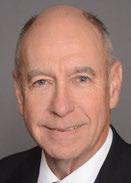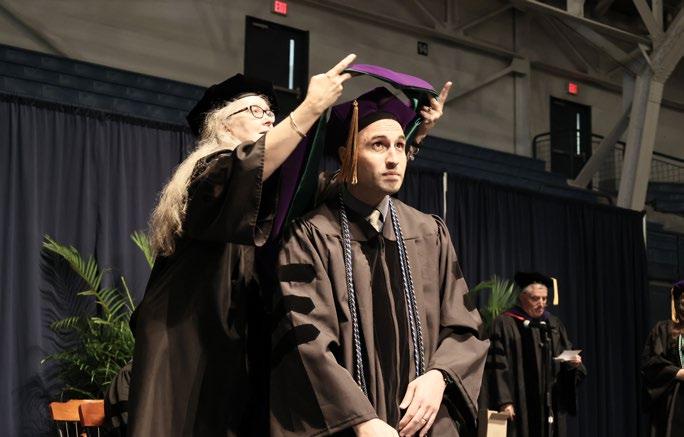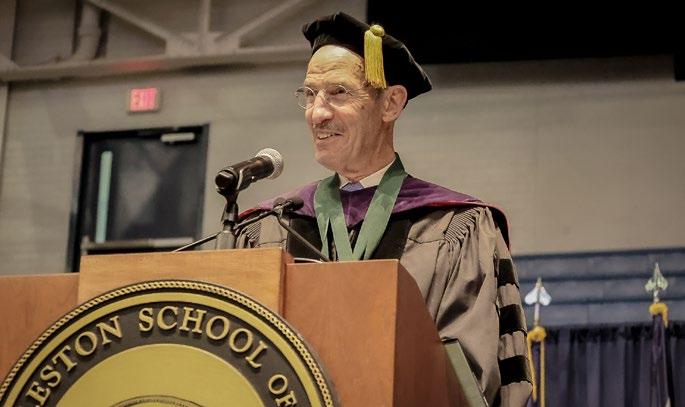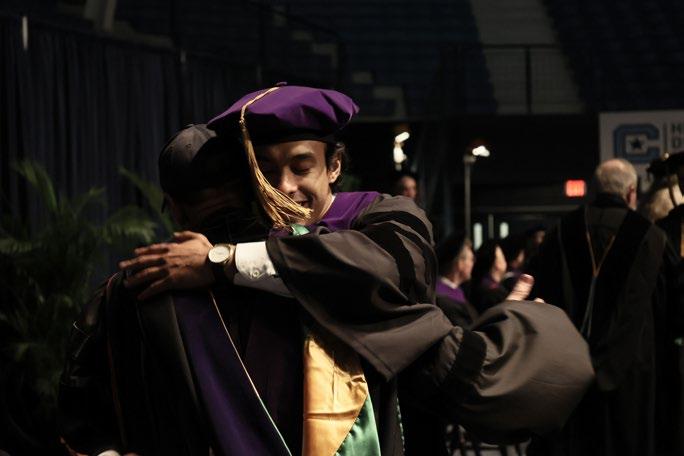












VOLUME 21 NUMBER 6 WEEKLY IN DIGITAL. IN PRINT. IN PERSON. Expertly Focused On Today’s Legal Professional. June 2023 | sclawyersweekly.com COURTS Assault suit against TSA screener revived PAGE 13 5 QUESTIONS WITH Bradley Anderton PAGE 8 escaping liability? ‘texas two-step’ under scrutiny PAGES 4-6









THERE’S STRENGTH IN NUMBERS. Looking for Co-Counsel? yarboroughapplegate.com | 843.972.0150 $23 MILLION Tractor-Trailer Crash $28.5 MILLION Medical Malpractice $15.7 MILLION Sca old Fall Injury $20 MILLION Worker Death at Concrete Plant $13.1 MILLION Road Defect and TBI $11.7 MILLION Insurance Bad Faith $10 MILLION UTV Rollover $10 MILLION Insurance Bad Faith RECENT VERDICTS AND SETTLEMENTS IN 2022: $26 MILLION PAID IN CO-COUNSEL FEES EVERY CASE IS UNIQUE AND PRIOR RESULTS DO NO GUARANTEE FUTURE OUTCOMES
JOLLEY MANAGING ATTORNEY JOLLEY LAW GROUP COLUMBIA


Kelly Jolley studied philosophy, English and pre-med courses at the University of South Carolina on her intended path to become a doctor, but a stint working as a researcher at the South Carolina Cancer Center sparked an interest in bioethics and consent agreements.

“I realized my mind is more practical than theoretical, so I switched to law school specifically to become a healthcare lawyer,” Jolley said. “I’ve been fortunate to be able to do exactly what I wanted to do.”
Today, she is widely regarded as a go-to source for medical professionals, businesses and nonprofits facing a variety of challenges, primarily financial stressors.
“Healthcare is expensive, both in delivery and in treatment,” she said. “Workforce scarcity, supply chain delays, and technology-enabled remote care are all issues of concern for my clients.”
“I think of my team and myself as a pit crew whose job is to help providers get back on track as quickly and efficiently as possible,” she said.
Charles Jordan grew up in Florence immersed in healthcare, watching his father, a pediatrician, care for his clients at his practice and at the local hospital.
He became interested in healthcare when he found himself immersed in healthcare contractual, transactional, and regulatory work during a summer clerkship.
Jordan, a partner at Moore & Van Allen in Charleston, views the growing costs and complexity of operating a healthcare organization as an ongoing problem for smaller players, including nonprofits, making it hard for them to survive.
“From early in my career I focused my practice primarily on nonprofit entities,” he said. “I was drawn to their charitable missions.”
After high school, Jordan put college on hold when he and a friend bought a one-way ticket to Australia, where they taught tennis at a local racquet club for three months.
“Our adventures there and the great friends we made continue to be one of the greatest experiences of my life,” he said.
Phillip Mullinnix didn’t follow his intended path into the law, but his ultimate destination has provided both challenges and rewards he could not have foreseen.
Initially, Mullinnix was on a course to corporate law, but discovered that through healthcare law, “I am making an impact on their ability to provide care to the community at large and potentially to my own family and friends,” he said.
He notes a key healthcare issue of the day involves the Centers for Medicare and Medicaid Services’ transition from the fee-for-service payment model to a value-based care model that rewards results, including cost, quality of care, and patient outcomes.
“As a result of this transition, healthcare providers are working diligently to understand and implement changes that comply with this transition,” said Mullinnix, who also participates in his firm’s pro bono program by working on guardianship cases and assisting various healthcare nonprofits with legal assistance.
Clark Price credits his mentor, the late Bill Hagood, with inspiring his love of healthcare law when they practiced together at Love, Thornton, Arnold & Thomason.

“Billy was a great trial lawyer and always well prepared,” Price said. “He approached his cases with empathy and kindness, and I aspire to practice like he did.”
Price is a member at Cassidy Coates Price in Greenville, where he focuses on medical negligence defense. He is also a certified mediator for civil cases, and in 2020 was named as a fellow in the American College of Trial Lawyers. He is also a past president of the Greenville County Bar Association.
Price says one of the most rewarding aspects of his practice is supporting medical providers.
“The COVID pandemic showcased the heroes who cared for the sick in the most trying times,” he said. “I am lucky and honored to have the opportunity to represent them when they need help.”
SOUTH CAROLINA LAWYERS WEEKLY | June 2023 17 HEALTHCARE
CLARK PRICE PARTNER CASSIDY COATES PRICE GREENVILLE
CHARLES M. JORDAN JR. PARTNER MOORE & VAN ALLEN CHARLESTON
PHILLIP MULLINNIX PARTNER NELSON MULLINS RILEY & SCARBOROUGH CHARLESTON
KELLY
Spinoff companies a two-step or sidestep?
Depending on whom you ask, the pejoratively titled “Texas two-step” is either a strategic, viable defense to mass tort claims or an unfair abuse of the Bankruptcy Code.
“The term is clearly meant to be an amusing reference to country line dancing, which is popular in Texas, as well as many other Southern states,” said Durham attorney Tom Wilmoth of the Law Offices of James Scott Farrin. “However, the ramifications of this legal maneuver are anything but amusing.”

The litigation strategy got its
name from a Texas law that defines a merger as either two companies coming together or one company dividing into two or more companies, called a divisive merger. The tactic is often used to defend claims such as those arising from asbestos and talc exposure, and looks something like this when a company faces tort liabilities: The company creates a spinoff entity — divisive merger — to which it assigns assets and liabilities. The spinoff can then file for bankruptcy while the primary business continues doing business as usual. Some attorneys, like Wilmoth, believe this is a means of gaming
the system.
“This absolves the original company of all liabilities and limits the total amount of money that can be used to settle claims,” Wilmoth said. “For example, (Johnson & Johnson) is worth approximately $470 billion. When it created LTL, it transferred about $2 billion in assets. J&J now contends that it is not liable for any talc claim; rather, LTL is the sole responsible party. If this is true, then J&J has effectively limited its maximum payouts for these lawsuits to LTL’s net worth — $2 billion.”

Boston attorney Michael Shepard is involved in four bank-



4 June 2023 | SOUTH CAROLINA LAWYERS WEEKLY NEWS COVER STORY
B y H EAtH H AMAcHEr
Depositphotos.com
ruptcy cases before the U.S. District Court for the Western District of North Carolina, cases involving Bestwall (formerly part of Georgia Pacific), DBMP (Certainteed), Aldrich (Ingersoll Rand), and Murray (Trane). The LTL matter was also in Charlotte before being moved to New Jersey, where J&J is headquartered, in 2021.
Shepard told Lawyers Weekly that while the Texas two-step affects only asbestos and talc victims today, it could one day affect any number of products — pharmaceuticals and vehicles, for instance — on the market that hurt people.
“You’re essentially removing one of the great safeguards that we have in this country from corporate negligence or malfeasance, and that is the right to a jury trial, the right to hold that company accountable,” Shepard said.
Wilmoth agreed, calling it a “legal loophole” and saying that he believes lawmakers intended for the law to be an efficient way to spin off new companies and grow the economy, not to exploit the system.
“By placing these claims in Bankruptcy Court, the focus is taken off the merits of the claims,” he said. “The plaintiff is no longer entitled to have a jury of her peers decide whether she is due compensation, and if so, how much.
Instead, accountants and lawyers calculate the number of legal claims and average out the amounts needed to settle them out of a much smaller pot of money. Bankruptcy courts are designed to fairly distribute money from a failing company to its creditors. It was never designed to forcefully settle personal injury and wrongful death claims against a solvent defendant.”
Not passing the buck
Charlotte attorney Garland Cassada of Robinson Bradshaw, who is involved in the litigation, disagreed, saying that a divisive merger does not eliminate or reduce a company’s liability for asbestos claims or impair the company’s ability to pay for them.
Instead, it allows the company to file a Chapter 11 case to resolve the liability while ensuring the company has the same ability to pay claims that existed before the merger. It does that, he said, by implementing an uncapped funding agreement in favor of the company assigned the liability requiring the spinoff company to pay the liability as it becomes necessary.
“Attempting to resolve asbestos litigation in a Chapter 11 case is a valid reorganizational purpose, even for a solvent company,” Cassada said. “Rather than ‘absolving’ a company of liability, a divisional merger and bankruptcy filing enables a company to consensually resolve all pending and future claims and pay them through an adequately funded settlement trust. The trusts operate through administrative procedures approved by representatives for claimants that are designed to pay valid claims fairly, equitably and promptly.”
Why Charlotte?
A decade-old ruling in In re Garlock (filed in 2010) might partially explain why companies have filed their cases in North Carolina. Garlock Sealing Technologies was
See Page 6
SOUTH CAROLINA LAWYERS WEEKLY | June 2023 5 NEWS COVER STORY
“Rather than ‘absolving’ a company of liability, a divisional merger and bankruptcy filing enables a company to consensually resolve all pending and future claims and pay them through an adequately funded settlement trust.”
— Garland Cassada Charlotte attorney
“You’re essentially removing one of the great safeguards that we have in this country from corporate negligence or malfeasance, and that is the right to a jury trial, the right to hold that company accountable.”
Michael Shepard Attorney in four N.C. bankruptcy cases
Continued From Page 5
a subsidiary of Enpro Industries, which is based in Charlotte. Garlock manufactured coated asbestos gaskets, and the Garlock plaintiffs included thousands of mesothelioma victims and an undisclosed number of future victims. The District Court held that Garlock’s total liability should be reduced from more than a billion dollars to $125 million, finding that Garlock’s “legal responsibility for causing mesothelioma is relatively de minimis.”
“The Garlock case is important because it resulted in a successful plan of reorganization, permanently resolving all pending and future asbestos litigation against the company,” Cassada said. “The plan was approved by a large majority of asbestos claimants, as well as a legal representative representing the interests of future asbestos claimants. Under the plan, Garlock created and funded a $480 million trust that assumed sole responsibility for paying valid present and future asbestos claims against Garlock.”
Cassada added that Garlock was important because it led to a precedent-setting opinion estimating the extent of the company’s liability for asbestos claims based partly on findings that asbestos plaintiffs and their lawyers often failed to disclose significant information about their exposures to other companies’ asbestos products. Based on these findings, Cassada said, the court concluded that Garlock’s past settlements were not an accurate gauge of its current and future liability.
But add J. David Butler of Rogers, Patrick, Westbrook & Brickman in Aiken, South Carolina, to the list of attorneys who believe that the tactic is an abuse of the bankruptcy system by corporations not really in financial distress.
“It is a strategy employed by other-
wise profitable companies to isolate liabilities and deny victims of corporate wrongdoing their day in front of a jury,” Butler said. “It is an effort by corporate America to end-run the constitutional right to trial by jury in this country through the misuse of the bankruptcy system.”
Litigation as far as the eye can see
Cassada noted that in 2021, the bankruptcy and district courts confirmed a reorganization plan in a case involving Kaiser Gypsum Co., saying that the plan received overwhelming consent from asbestos claimants and the support of a future claimants’ representative. That plan was upheld by the 4th U.S. Circuit Court of Appeals earlier this year.
In the LTL matter, tens of thousands of lawsuits claimed that J&J’s baby powder caused ovarian cancer and mesothelioma. Talc claimants moved for the Bankruptcy Court for the District of New Jersey to dismiss LTL’s bankruptcy case, arguing that it was not made in good faith. The court denied those motions, but in January, the 3rd U.S. Circuit Court of Appeals dismissed LTL’s bankruptcy petition, finding that Chapter 11 is appropriate only for entities facing financial distress and that LTL was well-funded to “manage and defend thousands of talc-related claims” and was highly solvent to comfortably meet its liabilities as they came due.
In his ruling, District Judge Thomas Ambro, a former bankruptcy judge, wrote that good intentions, such as protecting J&J’s brand or comprehensively resolving litigation, alone do not suffice.
“What counts to access the Bankruptcy Code’s safe harbor is to meet its intended purposes,” he wrote in his ruling. “Only a putative debtor in financial distress can do so. LTL was not. Thus, we dismiss its petition.”
Ambro added that some might argue “any divisional merger to excise the liability and stigma of a product
gone bad contradicts the principles and purposes of the Bankruptcy Code,” but that it is a call to be made on another day, in another case.
From Butler’s perspective, that day and case can’t come soon enough. He said that there is no reason the defense strategy cannot extend to pharmaceutical companies, automakers or any other corporate citizen “facing a reckoning over dangerous products or conduct” and looking to avoid those liabilities in court.
“If the misuse of the bankruptcy system through the Texas two-step is permissible, financially viable corporations can dodge accountability in the jury system and hide behind bankruptcy laws designed to protect those who are actually in financial distress,” he said. “The Texas twostep blunts accountability and therefore also provides a disincentive to corporations to make their products safer.”
Cassada said that if a company is not allowed to “two-step,” it would remain in Chapter 11 and be sued in state and federal courts nationwide for decades to come. This would benefit no one, he said, as litigation is expensive, time-consuming and highly uncertain for all parties.
“Individuals with similar claims often obtain substantially different results, ranging from no recovery to wildly disparate recoveries,” Cassada said. “Future claims may receive no recovery at all. A successful bankruptcy reorganization, in contrast, establishes an asbestos trust that promptly and efficiently pays claims through administrative procedures that ensure equivalent treatment of similar claims, including future claims, thereby avoiding the expense, delay and uncertainty of litigation in the tort system.”
Exactly how this litigation plays out is anyone’s guess, but the ongoing cases are highly contested and will likely be so for some time.
“It’s going to be a soap opera for sure,” Shepard said. ◆
6 June 2023 | SOUTH CAROLINA LAWYERS WEEKLY
NEWS
COVER STORY










































Available Dates Calendars Online for the State’s Most Experienced Neutrals SOUTH CAROLINA CHAPTER Visit the Academy’s free database of over 1000 of the nation’s top litigator-rated neutrals at www.NADN.org Visited by over 1000 unique legal staff monthly, SCMediators.org assisted firms in the scheduling of over 3000 mediations in 2022, for free!
Danny Crowe Jon Austen
Theron Cochran
Ellen Adams
Sam Clawson
Anne Culbreath
Bob Calamari Kevin Barth Kip Darwin
Eric Englebardt Karl Folkens
Earl Ellis Vernon Dunbar
Amy Gaffney
Rob Hassold Mills Gallivan
Mitch Griffith
Harry Goldberg
Richard Hinson
Bill Lyles
David McCormack Ben McCoy Regina H. Lewis
Stuart Mauney
Becky Laffitte Marvin Infinger Anthony Livoti
John Moylan
Walter B. Todd, Jr.
Tom Stephenson Lee Plumblee Franklin Shuler Lana Sims, Jr. Ronald Stanley Darren Sanders Matt Story
Thomas Wills Brad Waring Ned Tupper Derrick Williams
Bo Wilson
QUESTIONS WITH... Bradley Anderton
Charlotte attorney Bradley Anderton was recently featured in a magazine article in which he discussed the issue of judges misunderstanding social media and technology and how that misunderstanding relates to sexual assault cases. According to the article, judges, often because of a generational gap, are unskillful regarding the intricacies of social media communication.
Anderton, of the Law Offices of Ja mes Scott Farrin, recently spoke with Lawyers Weekly about this issue, citing a case that he was part of as an assistant district attorney. The firm also has an
office in South Carolina.
Anderton left the district attorney’s office in 2022 and signed on with James Scott Farrin, changing careers after deciding that he wanted to “stand up for the little guy instead of prosecuting him.” He practices in the areas of car accidents and personal injury and is a member of Assistance League Charlotte, where he volunteers as an attorney coordinator and attorney trainer in the Mecklenburg County Teen Court program. He also serves as a member of the North Carolina Advocates for Justice, working with the auto torts and premises liability section.
Anderton graduated from North Carolina State University with a bachelor’s degree in economics before earning his law degree from the University of North Carolina School of Law in 2021.
OnlyFans, the website discussed in the interview, has been around since 2016 and is a social media platform that can be used by anyone, including writers, artists, cooks and fitness trainers, to post material. It is widely known, however, for being used by sex workers who post images and videos of themselves and interact with their fans via private messages. Content is made available for a monthly fee and one-time tips.

8 June 2023 | SOUTH CAROLINA LAWYERS WEEKLY
FEATURE
5
B y H EAtH H AMAcHEr
Q. You spoke in a recent news article about a woman who claimed that a man had assaulted her after she rejected his advances. The woman lost the case. Tell me about that.
A. The first thing to understand about the case is the context of the system. At the time, I was an assistant DA in criminal District Court. I represented the interests of the state, the community, and justice. A lot of the time, that means advocating for victims, but not always. In this case, I was certainly trying to help the victim get closure.
Because of the nature of their online sex work, the victim did not feel comfortable calling the police about the incident and instead took out a self-initiated criminal summons on the defendant. That system sometimes gives people confusion; here in North Carolina (and a number of other states), people can swear out charges on others by simply going to the magistrate’s office and explaining what happened to them. Oftentimes, magistrates are a rubber stamp and issue either a summons or a warrant. At that point, the DA’s office gets involved as the case becomes an active criminal case in the district courts. That is what happened here.
At trial, I presented the facts of the case as best I could, using the victim as a witness. Unfortunately, we lost the trial because defense counsel asked about the nature of the victim’s relationship with the defendant, which opened the door to a discussion about her work on OnlyFans. I objected, but criminal District Court is not like what we see on TV. It is not a court of record — there are no audio, visual, or stenographic records — and judges operate as both the finder of fact and gatekeeper of law. In other words, once the cat is out of the bag, there is no wrangling it back in.
Here, the judge had some confu-
sion about what OnlyFans was and took a recess to learn about it. Once the evidence was concluded, the judge did not find the victim credible based on her OnlyFans work, and that was enough to give the judge reasonable doubt and therefore find the defendant not guilty. At that point, the case is over. There is no way to appeal; it is dead.
I was, of course, disappointed that I could not give this woman the closure she needed. But this is a common experience in district courts. When cases come down to one person’s word against another, getting beyond a reasonable doubt is nearly impossible.
Q. What is the conflation by a judge of online sex work and consent?
A. I don’t necessarily think there was a conflation of the two in this case. I think the case turned on how the judge viewed the victim and the nature of the work she was doing. I think it was difficult for the judge in this case to determine what happened because two very different pictures were painted by each side, and sex work is inherently polarizing.
Was there a consent issue in this case? Yes. That is what started the events which lead to criminal charges against the defendant. But, of course, the defendant was found not guilty because the case became a “he said, she said” situation without enough tangible evidence to find guilt beyond a reasonable doubt.
More generally, however, I do think the intersection of sex work and consent is important to consider. People often seem to hear, “She was asking for it, because of ….” The reasons are many — her outfit, being at a bar or being a sex worker. Just because someone does sex work does not mean they shouldn’t have autonomy over their body, but I think attitudes are still very mixed on that.
Q. How do cases like this depend on a judge's awareness of online communication platforms?
A. Increasingly, cases involve social media, online communications and new technology. The social media landscape changes so quickly that it is hard for anyone to keep up. But having literacy in social media, online communication and emerging technology is important for lawyers and judges to effectively do our jobs.
In all cases, not just those like this one, understanding — or at least having awareness of — emerging technology and social media is crucial.
Q. How common do you think it is that these types of cases are affected by this lack of understanding?
A. I think cases all across this state, country and world are impacted by an understanding of emerging technology and social media, or lack thereof. There are big questions to consider about what is constitutional — just think about the amount of information you can discover about a person by looking through their phone! The question becomes where the line is; unfettered access to everything gives a very complete picture of a person, but we have to balance that against privacy concerns and what is really relevant to a case.
Q. What do you see as a solution?
A. More technology literacy is needed for sure, and perhaps we can address that through CLE requirements. We also need to take a serious look at the rules of evidence as they relate to technology and social media as well as creating some new constitutional doctrine to reflect the realities of our current time. ◆
SOUTH CAROLINA LAWYERS WEEKLY | June 2023 9
FEATURE 1 2
3 5 4
Firm’s search warrant fight not covered by insurance
Alaw firm’s expenses to fight a search warrant and defend one of its partners during a criminal investigation weren’t covered losses under the firm’s malpractice insurance policy, the 4th U.S. Circuit Court of Appeals has held.
The government seized documents from a law firm representing the target of a racketeering investigation. After prevailing in court, the firm filed a claim with its professional insurer for its defense costs, arguing that the search warrant was a request for relief under the policy.
The district court dismissed the firm’s
claim, holding that a search warrant wasn’t a request for relief that demanded compliance and therefore not a “claim” under the policy. The court was also skeptical that conflict letters regarding a firm partner were claims.
The 4th Circuit affirmed that holding.
“Contrary to Appellants’ assertion that a warrant ‘demands compliance,’ the target of a warrant is ‘not asked to say or to do anything’ in response to the warrant,”

4th U.S. Circuit Judge Stephanie D. Thacker wrote for the court. “Instead, the warrant authorizes law enforcement to carry out the search and seizure without
regard to any response by the target of the warrant.”
Thacker was joined by Senior Judge Barbara Milano Keenan and Judge J. Harvie Wilkinson III in Brown Goldstein Levy LLP v. Federal Insurance Company.
The investigation
The law firm of Brown Goldstein Levy LLP, or BGL, represented attorney Kenneth Ravenell, who was being investigated for federal racketeering. In a letter, the government informed BGL partner Joshua Treem
See Page 12
10 June 2023 | SOUTH CAROLINA LAWYERS WEEKLY COURTS
B y N ick H ursto N
Depositphotos.com























































































































































































































Take the first step today toward building equity in your brand, promoting your excellence and offering your audience more reasons to trust you. Contact EVG, and a member of EVG’s content licensing team will be happy to answer your questions and get you started. enveritasgroup.com You’ve Earned it... EnVeritas Group: creative licensing solutions for brands that earn accolades they deserve. A now Promote it! Enveritas is the exclusive reprints and logo licensing partner for South Carolina Lawyers Weekly VOLUME 19 NUMBER 31 ■ JUNE 8, 2020 ■ SCLAWYERSWEEKLY.COMolina has granted federal inmate’s motion for a reduced sentence in light of the presence COVID-19 at his North Carolina prison facility. The order is reportedly the first in theprisoners in both South Carolina and Joseph Leslie Griggs pleaded guilty in 2018 to illegal possession of firearms. In August 2019, he was senbut in May he moved to have his sentence reduced pursuant to the federal compassionate release statute. Congress recently amended the statute as part of the First Step Act, to allow inmates to petition the federal courtsGriggs argued that his release was required due to his medical conditions—particularly chronic obstructive pulmonary disorder (COPD)— and the spread of COVID-19 at theGriggs had failed to make a sufficient showing of extraordinary and compelling reasons under the U.S. Sentencing Guidelines’ Policy Statement. But U.S. District Judge Donald C. Coggins Jr. ruled that the policy updated since the First Step Act was passed. Coggins relied on the discretion vested in district courts to apply the factors spelled out in federal law in granting Griggs’s motion.at FCI Butner Low,” Coggins wrote. “The Court is reluctant to modify Defendant’s sentence, as he has already been spared years of time in federal prison due to his medical conditions. His criminal conduct was egregious destroys elderly and seriously infirm inmates in BOP custody.” A‘perfect storm of preexisting conditions’-dinary and compelling reasons” warrant a sentencing reduction, Coggins said. Griggs argued that his extensive medical conditions established exfor sentence reduction. The court ac-including spinal stenosis, degenerative disc disease, narrow spinal canal, conjoined nerves at the lumbar of his back, sciatica nerve pain, high cholesterol, high blood pressure,his placement at FCI Butner Low, had been confirmed among inmates as May 21. “The Court further acknowledgeswith COVID-19,” Coggins wrote. “The Court particularly concerned with Defendant’s COPD.” District courts in other states have granted compassionate release mo“The common thread among these reduction is justified only when defendant is of relatively advanced age and suffers from serious preexistingcompassionate release and will only grant such requests in extraordinary and compelling cases.” Coggins emphasized that potential exposure to COVID-19 alone is not basis for reduced sentence, nor doesdefendant on case-by-case basis. climb Applying the statutory factors,Griggs was “brazen” about his criminal conduct, Coggins wrote, leaving numerous stolen goods in plain view at his house and purchasing firearm from law enforcement property crimes.es of Griggs’s offense and history, as well as the seriousness of the offense, weighed in favor of serving his full“The number of positive cases among inmates and staff continues at Butner,” he wrote. “This directly endangers Defendant’s health; however, it also stifles the opportunity adequate treatment for his medical Griggs’s sentence to time served, he imposed several conditions, modifying the three years of supervised release to home incarceration for the first 18 months (with GPS location monitoring), a 14-day self-quarantine work, church, or social events). Coggins also sent message to the BOP, reminding the agency that it in the best position to evaluate inmates’ health conditions, risk of in-give full consideration to all motions for compassionate release and be mindful of the lack resources available to many federal inmates,” the ruling reads. “Law must be apfairly to all inmates, not just those high-profile inmates who can afford bullpen of legal and medical experts.” More cases to come? represented Griggs. Michael R. Ray from Hartsville, non-attorney who assisted with Griggs’ defense, said that this was the first case in the District of South Carolina where an inmate received compassionate release for release under the First Step Act,defendant,” Ray said. “Judge Coggins didn’t think he deserved to be out, he served long enough, but he couldn’t turn blind eye to the dangers facing [Griggs] if he stayed in prison.” The order could be the first of many in the state, with lawsuit recently filed by the ACLU on behalf of incarcerated individuals at risk of serious harm or death from COVID-19 due to-ty Detention Center such as allowing free, unlimited access to soap, disinfecting cleaners, and personal protective equipment, as well as requiring social distancing six feet, with enforcement. guilty to charges of fraud and began serving 24-year prison sentence in 2008. Mount Pleasant attorney Cameron Jane Blazer handling Parish’s appeal and will point to the Griggs depossess the ability to protect the people who are there from this or other kinds of health issues arising out of institutionalized settings,” Blazer said. The Associated Press In a first, COVID-19 concerns lead to compassionate release for inmate 2020 Reprinted with permission of North Carolina Lawyers Weekly © 2020 Evan Meyer Slavitt Senior Vice President, General Counsel, Corporate Secretary AVX Corporation Greenville Evan Meyer Slavitt believes lawyers must lead with an eye toward the values of the profession and the next generation of lawyers that will follow them. “Being a leader is more than just an operational job. It requires strong ethical and teaching component,” he says. Slavitt grew up on Cape Cod in Massachusetts and enjoyed participating in the Harwich Junior Theatre, an organization that relied on participating children to act, build the sets, run lighting and sound, work on costumes, and perform other chores. In that environment, the adults expected the kids to be responsible and professional. “I think this approach was essential to my later academic and professional success,” he says. “Further, got a chance to fly on stage as John in Peter Pan and to play Templeton the Rat in Charlotte’s Web,” he says. Slavitt earned Bachelor of Arts and Master of Arts degrees in economics from Yale University and a J.D. from Harvard Law School, where he was editor of the Harvard Law Review. He is senior vice president, general counsel, and corporate secretary at AVX Corporation, a global manufacturing facility in Greenville. He is also commercial, environmental, and appellate panel member for the American Arbitration Association. He points to Bob Sylvia as his most important mentor who taught him lessons about how to be an effective trial lawyer. “Bob was a partner in a law firm joined when went into private practice,” Slavitt says. “In addition to his technical coaching, he helped me understand how to find joy in the grind of litigation and how to manage the stress of private practice.” If Slavitt had not become a lawyer, he likely would have pursued a career in economics because “economics is both intellectually challenging and has real-world implications,” he says. His first job at a bakery, which required him to go to work at a.m. every day, taught him to find joy in his work. “The lead baker was always there when arrived, and had been for some time,” Slavitt says. “He never complained because he loved what he did and showed me the important of finding work that you love, because that diminishes all the ancillary problems.” While Slavitt cites managing work/ life balance as one of his biggest career challenges, he draws from advice his Latin teacher gave him to put things in perspective. “He said ‘don’t sweat the small stuff,’” he recalls. “Just because something is immediate, doesn’t mean it is important. When there were chores to do at home, they sometimes didn’t get done because taking my kids to the park was more important.” When Slavitt takes a vacation, he enjoys visiting islands in the Caribbean where his cell phone doesn’t work, and where he can simply sit on the beach with fruity beverage. Some people may not know that Slavitt likes to relax by doing needlepoint, and he has published a novel titled Death of Prosecutor.
Continued From Page 10
COURTS that he was also under investigation.
The letter advised BGL of several nonwaivable conflicts of interest that prevented Treem from continuing to represent Ravenell. The government asked BGL to promptly notify them if Treem didn’t intend to withdraw.
Rather than withdraw, Treem retained his own attorneys. Six months later, while executing a search and seizure warrant for BGL’s offices, the government seized tens of thousands of documents, including all of Treem’s emails, regardless of their relevance to Ravenell.
In another letter, the government informed BGL that the grand jury had substantial evidence linking Treem to crimes. A filter review protocol would segregate any privileged documents seized, the government asserted.
A third letter indicated a possible conflict of interest for Treem to represent a defendant in a related civil case. The client could waive the conflict, but the government wanted that waiver confirmed for the court. Again the government asked for notice of Treem’s intentions.
BGL and Treem moved for a temporary restraining order and a preliminary injunction, as well as a return of all seized property, in the District Court of Maryland.
BGL prevailed in litigation, although it claims to have incurred more than $230,000 in costs.
Insurance claim
Federal Insurance Co. provided BGL with a professional liability insurance policy. The policy’s definition of “Claim” included “a written demand or written request for monetary damages or non-monetary relief … against an Insured for a Wrongful Act” [emphases in original].
While “loss” included “defense costs,” the policy required the existence of a claim when the losses were incurred. The term “wrongful act” pertained solely to professional services by BGL or an insured person acting on behalf of the firm.
BGL and Treem filed a claim under the policy for losses incurred in the search
warrant litigation and costs to defend Treem in connection with the criminal investigation. After the insurer denied coverage, BGL sued for declaratory judgment and breach of contract in the District Court of Maryland.
Chief District Judge Thomas E. Johnson dismissed the complaint, holding that the search warrant claim wasn’t covered because it didn’t fall within the policy’s definition of “Claim.” Even if it did, the judge said BGL’s costs didn’t constitute “defense costs” under the policy.
Johnson noted that “[s]earch warrants are not forms of ‘relief,’ but rather constitute judicial authorization — based upon a finding of probable cause — to conduct searches of places and things.’”
Because “‘[t]he Government did not seek to redress any diminution of its legal rights, nor did it seek remedy for any harm brought upon it by [Appellants] in its pursuit of the Search Warrant,’ the warrant application was not a demand or request for relief against the insured,” Johnson added.
Feeling skeptical that the government’s conflict letters constituted “Claims,” Johnson held that the related costs also weren’t covered under the policy.
BGL and Treem appealed.
Not ‘relief’
Thacker found that the policy’s definition of “Claim” wasn’t ambiguous. The appellants argued that the government’s warrant application expressly “‘request[s]’ relief against BGL, and the issued warrant demands compliance.”
Here, the Fourth Circuit agreed with the district court’s holding that the search warrant application wasn’t a written request for non-monetary relief.
“To be sure, the warrant application asked the court to grant law enforcement authorization to search and seize BGL’s files,” Thacker wrote. “But that authorization is not relief ‘against an Insured’ as required by the Policy.”
Per Black’s Law Dictionary, relief means “[t]he redress or benefit, esp. equitable in nature … that a party asks of a court.”
“Relief against the insured,’ then, is the redress or benefit one party seeks, via
court order, from another party,” Thacker wrote. “When the Government asked the court for authorization to search and seize BGL’s files, it was not seeking redress or a benefit from BGL. Indeed, the warrant was issued and directed to law enforcement — not to BGL.”
While it may have been adverse to BGL, the search warrant wasn’t “against an Insured.”
“That is, the target of a warrant is ‘not asked to say or to do anything’ in response to the warrant,” Thacker explained.
The 4th Circuit rejected the appellants’ argument based on cases which held that subpoenas are written demands or requests for relief.
“[A] subpoena differs from a search and seizure warrant in that it does command the recipient to comply,” the judge said.
Similarly, Thacker was unpersuaded by the argument that there “could not be a clearer example of a written demand for nonmonetary relief” than the conflict letters.
“Each of the letters at issue was sent by the Government to ‘advise’ Treem of his status and inform him of potential conflicts of interest,” the judge said.
Rather than demanding or requesting Treem’s withdrawal, the government merely requested notice of Treem’s intentions.
The 4th Circuit affirmed the dismissal of the complaint.
‘Not frivolous’
Andrew Levy, a partner with BGL, described how armed federal agents came to their Baltimore office in body armor with a battering ram to execute the search warrant.
“It was like they were invading a crackhouse,” he told Lawyers Weekly. “For that to happen to someone with as distinguished a career as Joshua Treem was really disgraceful. Fortunately, justice prevailed and Treem was acquitted.”
Describing insurance coverage law as “arcane,” Levy believed the search warrant was a written demand for nonmonetary relief because that clause wasn’t modified by the word “civil” like other parts of policy’s definition of “claim.”
“It was not a frivolous claim,” he asserted. ◆
12 June 2023 | SOUTH CAROLINA LAWYERS WEEKLY
Assault suit against TSA screener revived
The Federal Tort Claims Act, or FTCA, allows people who claim they were assaulted by Transportation Security Administration, or TSA, screeners to sue the federal government, the 4th U.S. Circuit Court of Appeals has held in an issue of first impression.
Joining with other U.S. Circuit Courts of Appeals, U.S. Circuit Judge Toby J. Heytens said the FTCA permitted a claim like the plaintiff’s and reversed the District Court’s dismissal of her case.
The appeal came down to a single controlling question: Are TSA screeners “empowered by law to execute searches, to seize evidence, or to make
arrests for violations of Federal law?”
Heytens said the answer is yes.
“Congress has granted TSA the authority to ‘screen … all passengers and property … that will be carried aboard a passenger aircraft,’ and it has defined such ‘screening’ (at least in the context of cargo) as including a ‘physical examination’ or a ‘physical search,’” the judge explained. “What is more, federal regulations require an ‘aircraft operator’ to ‘refuse to transport’ any person ‘who does not consent to a search or inspection of his or her person’ by TSA screeners.”
U.S. Circuit Judge Stephanie D. Thacker and U.S. District Judge Joseph Dawson III, sitting by designation from
the District of South Carolina, joined Heytens in Osmon v. United States
‘Groin search’
When Erin Osmon passed through a TSA security checkpoint at Asheville Regional Airport, a screener told her the body scanner “alarmed on her” and she needed to submit to a groin search.

Per the opinion, Osmon claimed the TSA screener forced her to spread her legs wider than necessary and fondled her genitals twice during the search.
Osmon sued the federal government for battery under the FTCA in the Western District of North Carolina.
SOUTH CAROLINA LAWYERS WEEKLY | June 2023 13
B y N ick H ursto N COURTS III
See Page 14 Depositphotos.com
Continued From Page 13
A magistrate judge recommended the District Court dismiss the suit. It was accompanied by a detailed memorandum about whether the FTCA waived sovereign immunity for Osmon’s claim. Osmon responded with a two-and-a-half page “Objection to Memorandum and Recommendation.”
Chief District Judge Martin K. Reidinger adopted the recommendation, saying “the Magistrate Judge’s proposed conclusions of law are correct and are consistent with current case law.” De novo review was unnecessary because Osmon failed to object with sufficient specificity, Reidinger held.
‘Modest bar’
According to the Federal Magistrate’s Act, district courts are required to “make a de novo determination of those portions of the report or specified proposed findings or recommendations to which objection is made,” Heytens noted.
“[A] party wishing to avail itself of its right to de novo review must be ‘sufficiently specific to focus the District Court’s attention on the factual and legal issues that are truly in dispute,’” the judge wrote. “Osmon easily cleared that modest bar.”
Here, Osmon responded to the magistrate judge’s recommendation with a written objection that framed a “‘pure question of law,’ the resolution of which controlled the outcome of a single dispositive motion,” Heytens said.
In her objection, Osmon identified areas of agreement, summarized the competing positions and cited cases from other circuits. Where those circuits agreed with the government’s view, they did so for different reasons than the magistrate judge recommended, she pointed out.
“There was, in short, no doubt about ‘the true ground for [Osmon’s] objection’ to the magistrate judge’s recommendation,” Heytens wrote, adding that the District Court erred by finding that Osmon merely summarized arguments and didn’t specifically object to the magistrate judge’s reasoning.
In fact, Osmon needed only to object to the magistrate’s recommendation rather than file a brief or memorandum of law and she didn’t need to frame her arguments anew.
“Such a requirement would require litigants to walk a tightrope between refining their existing arguments just enough to preserve them for de novo review but not so much to risk having them considered forfeited because they were never presented to the magistrate judge in the first place,” Heytens explained.
TSA authority
The FTCA contains a “law enforcement proviso” that allows claims for “assault” or “battery” arising out of “acts or omissions of investigative or law enforcement officers of the United States Government.”
Heytens said the government’s discussion about whether TSA screeners are “law enforcement officers” generally missed the mark.
“Congress has defined ‘investigative or law enforcement officer’ as ‘mean[ing] any officer of the United States who is empowered by law to execute searches, to seize evidence, or to make arrests for violations of Federal law,’” the judge wrote.
The government didn’t challenge the magistrate judge’s conclusion that TSA screeners are “officers of the United States” within the meaning of the law enforcement proviso.
“This means the only appellate decision favoring the government’s position — an unpublished and unsigned decision issued without oral argument — rested on grounds the government no longer advances,” Heytens noted.
Also, the Virginia Supreme Court has “emphasized that ‘[t]he plain text’ of the law enforcement proviso ‘confirms that Congress intended immunity determinations to depend on a federal officer’s legal authority, not a particular exercise of that authority,’” Heytens said.
As such, Osmon’s appeal came down to whether TSA screeners were “empowered by law to execute searches, to seize evidence, or to make arrests for violations of Federal law.”
Heytens said the answer was yes.
“Because the law enforcement proviso ‘speaks in the disjunctive,’ TSA screeners need be empowered only to do one of the three listed things — that is, execute searches, seize evidence, or make arrests,” he said.
The government contended that the language only covered searches that were criminal and investigatory, unlike an “administrative search” which takes the form of an “inspection” or “screening.”
Heytens pointed to a flaw in the argument — the word “criminal” appears nowhere in the law enforcement proviso.
“Here, as elsewhere, we ‘may not narrow a provision’s reach by inserting words Congress chose to omit,’” Heytens said.
Similarly, the proviso didn’t imply police powers in criminal investigations.
“True, the words ‘make arrests’ are limited to the criminal context, and ‘seiz[ing] evidence’ is often — and likely most often — used in that context,” Heytens said. “But government officials investigate plenty of violations of law that are civil, not criminal, in nature, and there is nothing linguistically strange about using the words ‘seize evidence’ in that context.”
Nor was the judge persuaded by the government’s focus on the word “execute.”
“[T]his statute — unlike all the others referenced in the opinion the government relies on for this point — does not contain the word ‘warrant,’” Heytens said. “Nor is this a trivial distinction, because the ability to execute a search does not necessarily imply power to execute a search warrant.”
Heytens acknowledged that the law enforcement proviso was added to the FTCA more than 40 years ago, and that it didn’t contemplate people working for an agency created more than 25 years after that.
“[T]he fact that a statute can be applied in situations not expressly anticipated by Congress does not demonstrate ambiguity. It demonstrates breadth,” the judge concluded, citing Pennsylvania Dep’t of Corr. v. Yeskey. “Because the words of this statute cover the claim Osmon brought, we reverse the District Court’s judgment and remand for further proceedings.”
14 June 2023 | SOUTH CAROLINA LAWYERS WEEKLY COURTS
◆
SOUTH CAROLINA LAWYERS WEEKLY | June 2023 15 HEALTHCARE p o we r L I S T T H E HEALTH CARE p o we r L I S T T H E p o we r L I S T
To see the full Power List profiles, visit www.sclawyersweekly.com. THE POWER LIST MATTHEW CHRISTIAN 16 LAURA JOHNSON EVANS 16 ALISSA D. FLEMING 16 ALICE V. HARRIS .................................................................. 16 KELLY JOLLEY ..................................................................... 17 CHARLES M. JORDAN JR .................................................... 17 PHILLIP MULLINNIX 17 V. CLARK PRICE 17 WILLIAM R. THOMAS 18 MICHAEL J. THOMERSON 18 MATTHEW P. UTECHT 18 HEALTHCARE
T H E
Matt Christian was exposed to healthcare law earlier than virtually all of his colleagues; in fact, he grew up immersed in it.
His father, Harold Christian, was likewise an attorney who focused on the practice area. “My dad would frequently discuss the law and the intriguing complexities of medical negligence and nursing home cases,” Christian said.
Noting his father’s passion for helping his clients, Christian decided to follow his footsteps and pursue a career in personal injury law. He began practicing at Christian & Christian in Greenville, a firm his father founded. He also practices with his brother, Joshua.
He strives to help people who have been injured and works to make long-term care facilities safer for residents.

“I found that the medical/healthcare niche was complex and fascinating, with every case being different, requiring me to learn new medicine and information along the way,” he said. “I have enjoyed those aspects of healthcare cases.”
ALISSA D. FLEMING
As a critical care nurse, Alissa Fleming had an insider’s view of healthcare long before she began her subsequent career as an attorney. She now her nursing experience to understand and strategically address her clients’ most significant challenges.
“Seeing healthcare from the inside inspired me to find a way to better collaborate with healthcare providers to make a difference in operations and delivery,” she said.
Fleming, a shareholder at Baker Donelson, was among the first team of attorneys who helped launch the firm’s new Charleston office in 2022.
She sees changes in reimbursement, workforce issues including staffing and provider shortages and the increasing cost of delivering care as among the most critical issues the healthcare sector is facing.


Helping her clients and healthcare providers solve these problems and find creative solutions to optimize healthcare operations while minimizing regulatory risk make the hard work worthwhile.
“I value my clients and feel incredibly grateful to work with them on a daily basis,” she said.
Laura Evans was a pre-med student at UNC-Chapel Hill — until she came face to face with organic chemistry.
“That changed my mind very quickly,” she said. While the coursework deterred her from becoming a doctor, it didn’t dim her passion for healthcare.
“I started my legal career as a litigator, but the medicine kept drawing me back,” she said. “I went in-house at a hospital system and was sold on healthcare law.”
A role as director of legal services at Roper St. Francis Healthcare gave her a keen insight into a variety of corporate, operational, compliance, and risk management, which makes her a valuable resource for her clients at the Charleston office of Shumaker, where she is a partner and health care business sector chair.
“Working in-house has put me in my clients’ shoes, and I can offer a legal solution that is easily made operational,” said. “It is rewarding to give legal advice that is practical, efficient, and improves patient care.”
From helping providers with compliance systems to defending clients and helping them with licensing matters, Alice Harris enjoys smoothing the path for healthcare providers so they can focus on their patients.
Harris is a shareholder in the Columbia office of Maynard Nexsen, where she focuses on litigation, healthcare law and life sciences.

She got her start in the 1990s after her former partners, Stuart Andrews and Dan Westbrook, established one of the first healthcare practices at Nelson Mullins, where she practiced for over 26 years.
“I enjoyed working with institutional and individual providers, and learning about the laws and regulations governing federal healthcare programs,” she said.
Harris gives back to her community in a variety of ways, including serving on a committee to support the Columbia branch of the Leukemia & Lymphoma Society.
“After losing my cousin to leukemia and having friends and colleagues who have suffered from loss related to blood cancers, I was motivated to help raise money individually and in support of Maynard Nexsen,” she said.
16 June 2023 | SOUTH CAROLINA LAWYERS WEEKLY HEALTHCARE
ALICE V. HARRIS SHAREHOLDER MAYNARD NEXSEN COLUMBIA
SHAREHOLDER BAKER DONELSON CHARLESTON
LAURA JOHNSON EVANS PARTNER SHUMAKER CHARLESTON
MATTHEW CHRISTIAN PARTNER CHRISTIAN & CHRISTIAN GREENVILLE
Kelly Jolley studied philosophy, English and pre-med courses at the University of South Carolina on her intended path to become a doctor, but a stint working as a researcher at the South Carolina Cancer Center sparked an interest in bioethics and consent agreements.

“I realized my mind is more practical than theoretical, so I switched to law school specifically to become a healthcare lawyer,” Jolley said. “I’ve been fortunate to be able to do exactly what I wanted to do.”
Today, she is widely regarded as a go-to source for medical professionals, businesses and nonprofits facing a variety of challenges, primarily financial stressors.
“Healthcare is expensive, both in delivery and in treatment,” she said. “Workforce scarcity, supply chain delays, and technology-enabled remote care are all issues of concern for my clients.”
“I think of my team and myself as a pit crew whose job is to help providers get back on track as quickly and efficiently as possible,” she said.
Charles Jordan grew up in Florence immersed in healthcare, watching his father, a pediatrician, care for his clients at his practice and at the local hospital.
He became interested in healthcare when he found himself immersed in healthcare contractual, transactional, and regulatory work during a summer clerkship.


Jordan, a partner at Moore & Van Allen in Charleston, views the growing costs and complexity of operating a healthcare organization as an ongoing problem for smaller players, in-cluding nonprofits, making it hard for them to survive.
“From early in my career I focused my practice primarily on nonprofit entities,” he said. “I was drawn to their charitable missions.”
After high school, Jordan put college on hold when he and a friend bought a one-way ticket to Australia, where they taught tennis at a local racquet club for three months.
“Our adventures there and the great friends we made continue to be one of the greatest experiences of my life,” he said.
Phillip Mullinnix didn’t follow his intended path into the law, but his ultimate destination has provided both challenges and rewards he could not have foreseen.
Initially, Mullinnix was on a course to corporate law, but discovered that through healthcare law, “I am making an impact on their ability to provide care to the community at large and potentially to my own family and friends,” he said.
He notes a key healthcare issue of the day involves the Centers for Medicare and Medicaid Services’ transition from the fee-for-service payment model to a value-based care model that rewards results, including cost, quality of care, and patient outcomes.
“As a result of this transition, healthcare providers are working diligently to understand and implement changes that comply with this transition,” said Mullinnix, who also participates in his firm’s pro bono program by working on guardianship cases and assisting various healthcare nonprofits with legal assistance.
Clark Price credits his mentor, the late Bill Hagood, with inspiring his love of healthcare law when they practiced together at Love, Thornton, Arnold & Thomason.

“Billy was a great trial lawyer and always well prepared,” Price said. “He approached his cases with empathy and kindness, and I aspire to practice like he did.”
Price is a member at Cassidy Coates Price in Greenville, where he focuses on medical negligence defense. He is also a certified mediator for civil cases, and in 2020 was named as a fellow in the American College of Trial Lawyers. He is also a past president of the Greenville County Bar Association.
Price says one of the most rewarding aspects of his practice is supporting medical providers.
“The COVID pandemic showcased the heroes who cared for the sick in the most trying times,” he said. “I am lucky and honored to have the opportunity to represent them when they need help.”
SOUTH CAROLINA LAWYERS WEEKLY | June 2023 17 HEALTHCARE
CLARK PRICE PARTNER CASSIDY COATES PRICE GREENVILLE
CHARLES M. JORDAN JR. MEMBER MOORE & VAN ALLEN CHARLESTON
PHILLIP MULLINNIX PARTNER NELSON MULLINS RILEY & SCARBOROUGH CHARLESTON
KELLY JOLLEY MANAGING ATTORNEY JOLLEY LAW GROUP COLUMBIA
Will Thomas started his career in hospital administration at the MUSC Medical Center, and with that job came the opportunity to get a Master of Health Administration degree.
Along the way, Thomas discovered the law.
The master’s program required a class in healthcare law, featuring MUSC general counsel Joe Good. Thomas recalls Good as an engaging presenter who would often “regale the class with stories of his legal exploits.”
Thomas also worked with attorneys who were structuring an affiliation between the medical center and a for-profit healthcare company.

“I was interested in that work,” he said. “One thing led to another and the next thing I knew, I was in law school.”



As a partner at Parker Poe in Columbia, Thomas handles litigation as well as transactional and regulatory matters.





“The greatest reward is the ability to use my education, training, and experience to help providers find solutions to their legal problems, especially when those problems are complex,” he said.
MATTHEW P. UTECHT


Matt Utecht credits a former colleague with leading him into the world of healthcare law.
“I had been a litigator defending medical malpractice cases for about 13 years when our firm’s managing shareholder, Joe Blake, approached me about transitioning to the transactional and regulatory side of healthcare law,” Utecht said. “I knew I had the best in the business to learn under, so I took the leap.”

Utecht serves on the Healthcare Committee for the South Carolina Chamber of Commerce and was a member of Leadership Greenville XXVIII. He points to the rise of artificial intelligence as a catalyst for change in the healthcare sector.

And he is grateful to work with his exceptional clientele. “As a healthcare lawyer, I get to work with some of the smartest people I’ve ever met,” Utecht said. “It is an honor to play a small part in helping them achieve their strategic goals and contribute to improving the delivery of care to patients.”
As founder and manager of The Thomerson Law Firm in Greenville, Michael Thomerson represents clients in the healthcare field in South Carolina, Georgia and Tennessee, while managing litigation and local counsel throughout the country.
For over 25 years, Thomerson has managed and handled litigation matters related to Stark and Anti-Kickback compliance for hospital systems and healthcare providers. He primarily represents and advises health care providers, lenders, landlords, and businesses in the field.
He also anticipates and responds to concerns regarding privacy and confidentiality of individual health information and increasing regulation at both the federal and state levels with experience handling compliance matters that involve HIPAA and HITECH privacy and security compliance, including resolving disputes and developing uniquely tailored privacy and security policies.
In addition to his extensive background in health law, Thomerson has more than three decades of experience representing clients in the areas of creditor’s rights, bankruptcy and landlord-tenant law
On-Call Legal Care
Shumaker congratulates Health Care Service Line Leader and Business Sector Chair Laura Evans on her recognition as a Power Player. Laura’s team serves a diverse array of local, regional, and national health care clients on a wide range of issues, including corporate transactions, health care compliance, risk management, and litigation. Having served in-house at a large hospital system, Laura is well-versed in operational matters, allowing her to provide practical advice that is easily operationalized.
18 June 2023 | SOUTH CAROLINA LAWYERS WEEKLY HEALTHCARE
SHAREHOLDER HAYNSWORTH SINKLER
MICHAEL J. THOMERSON FOUNDER THE THOMERSON LAW FIRM GREENVILLE
BOYD GREENVILLE
LAURA JOHNSON EVANS
shumaker.com Florida - North Carolina - Ohio - South Carolina
WILLIAM R. THOMAS PARTNER PARKER POE COLUMBIA
843.996.1913 levans@shumaker.com
Legal Insight Business Instinct Community Impact
Civil Practice
Appeals – 11th Amendment Immunity –
State OSHA Enforcement
Two of the plaintiff-employer’s employees died because of a fire at work, and North Carolina’s Occupational Safety and Health Hazard Association (NC OSHA) assessed several penalties against plaintiff. Plaintiff alleges that defendants – officials with authority over NC OSHA – are in violation of 29 U.S.C. § 657(h) because they evaluate their employees’ performance based on the number of penalties they have assessed and citations they have issued. Because plaintiff seeks prospective relief – a declaratory judgment and injunctions – plaintiff’s claims fall within an exception to defendants’ Eleventh Amendment immunity.
We affirm the district court’s denial of defendants’ motions to dismiss and for judgment on the pleadings. We decline to reach the issues defendants raised for the first time on appeal.
Despite the Eleventh Amendment’s prohibition against citizens suing states in federal courts, Ex Parte Young, 209 U.S. 123 (1908), allows private citizens to petition a federal court to enjoin state officials in their official capacities from engaging in future conduct that would violate the U.S.
Constitution or a federal statute.
Plaintiff alleges that defendants’ violation of the federal Occupational Safety and Health Act (OSH Act) is “ongoing” or “continuing,” citing, among other things, defendant Dobson’s repeated admissions that NC OSHA’s compliance officers’ performance is based, in part, on the number of citations they issue.

The relief plaintiff seeks, including injunctive relief, is prospective in nature. Its injunctive claims ask to prohibit defendants “from engaging in enforcement activities against [plaintiff], including initiating or maintaining administrative proceedings” and “from engaging in enforcement activities against any employer that has been inspected or issued citations under the official policy or practice . . . including issuing citations, prosecuting existing citations, or initiating or maintaining administrative proceedings.”
Plaintiff’s complaint does not seek to expunge their past citations but to preclude defendants from continuing their alleged illegal policies or practices (which plaintiff likely could not have discovered until after the citations were issued) that they believe are in violation of the federal OSH Act. Even assuming plaintiff’s requested relief relies on defendants’ previous allegedly unlawful actions, the true essence of the relief is prospective.
Finally, defendants insist that the North Carolina Department of Labor, and therefore the State of North Carolina, is the true party in interest. Not so.
The complaint does not seek action by North Carolina, but rather, by the named defendants who are at the helm of the North Carolina State Plan’s operation. Thus, defendants Dobson and Beauregard were properly named as such in this suit.
For the first time on appeal, defendants have raised issues of standing and abstention. Because resolution of these issues is not inextricably intertwined with the Eleventh Amendment immunity question, we decline to exercise pendent appellate jurisdiction over these issues.
Affirmed.
Industrial Services Group Inc. v. Dobson (Lawyers Weekly No. 001-061-23, 20 pp) (Roger Gregory, C.J.) No. 22-1465. Appealed from USDC at Asheville, N.C. (Martin Reidinger, C.J.) Stacey Alayne Phipps, Joshua Stein and Victoria Voight for appellants; Travis Wayne Vance and David Klass for appellee. 4th U.S. Circuit Court of Appeals
Civil Practice
Involuntary Commitment –Conditional Discharge Revocation –Standard of Proof & Judicial Process
Before revoking the conditional release of an inmate who had been committed due to mental illness, a court must establish a reasoned and logical linkage between the individual’s failure to comply with the conditions of his discharge on the one hand with the finding on the other that “his continued release would create a substantial risk of bodily injury to another person or serious damage to property of another.”
Since the district court did not have the benefit of our decision before revoking respondent’s conditional discharge, we vacate the revocation and remand for further proceedings.
This appeal presents two consequential questions related to the continued involuntary commitment of those afflicted with a mental illness. First, we are asked to set the proof standard necessary to support revocation of conditional discharge under 18 U.S.C. § 4246(f). No circuit has exhaustively addressed the question. Second, we consider the process by which the district court should make and support its crucial findings on dangerousness under § 4246(f) (the “dangerousness inquiry” or “risk assessment”).
In § 4246(f), Congress expressed no proof standard.
SOUTH CAROLINA LAWYERS WEEKLY | June 2023 19 OPINIONS
www.sclawyersweekly.com.
To view the full list of opinion digests, please visit
See Page 20
Continued From Page 19
A § 4246(f) revocation decision will hinge upon the outcome of a hearing, after which the district court must determine “whether the person should be remanded to a suitable facility on the ground that, in light of his failure to comply with the prescribed regimen of medical, psychiatric, or psychological care or treatment, his continued release would create a substantial risk of bodily injury to another person or serious damage to property of another.” 18 U.S.C. § 4246(f). The plain meaning of the text is whether the (1) subject’s “failure to comply with the prescribed regimen of medical, psychiatric, or psychological care or treatment” (2) would result in “a substantial risk of bodily injury to another person or serious damage to property of another.” 18 U.S.C.A. § 4246.
Before revoking probation, a court must establish a reasoned and logical linkage between the individual’s failure to comply with the conditions of his discharge on the one hand with the finding on the other that “his continued release would create a substantial risk of bodily injury to another person or serious damage to property of another.”
It is not the district court’s obligation to discern and develop the factors, statistical risk predictors, or other factual parameters bearing on this individualized inquiry. Instead, the district court should expect counsel and facility professionals to appropriately develop the matter prior to, and then, if necessary, during the hearing. And if they default, the district court should direct them to drill down and perform their due diligence.
That process did not occur here. First, counsel failed to furnish the district court with a documentary record required for this committee. Second, the district court failed to require more.
Under the standards we establish today, a district court may now revoke conditional discharge upon finding by a preponderance of the evidence that (1) the individual failed to comply with his treatment regimen, including all conditions reasonably related thereto, and that, in light of that
failure, (2) his continued release would create a substantial risk of bodily injury to another.
Vacated and remanded.
Concurrence
(Agee, J.) I write separately because the majority opines at length on matters unnecessary to resolve the case before us and which are not contained in the record.
The district court failed to make any findings connecting respondent’s failure to comply with the conditions of his discharge to a determination that “his continued release would create a substantial risk of bodily injury to another person or serious damage to property of another.” That is sufficient, in and of itself, to require remand.
United States v. Perkins (Lawyers Weekly No. 001-060-23, 112 pp.) (Volk, J.) (Steven Agee, J., concurring) No. 20-7024. Appealed from USDC at Raleigh, N.C. (Earl Britt, S.J.) Jennifer Claire Leisten and Alan DuBois for appellant; Genna Danelle Petre and Robert Higdon for appellee. 4th U.S. Circuit Court of Appeals
Criminal Practice
Sentencing – ACCA – Prior Convictions – Different Occasions
The Armed Career Criminal Act (ACCA) allows for the enhancement of a sentence if the defendant has “three previous convictions . . . for a violent felony or a serious drug offense . . . committed on occasions different from one another.” The court rejects defendant’s argument that a jury must decide whether prior offenses were committed on different occasions.
We affirm defendant’s enhanced sentence.
In a consolidated trial, defendant was convicted of committing one armed robbery on July 14, 2007, and another on September 24, 2007. In this federal weapons-possession case, the district court counted each of the two 2007 robbery conviction towards defendant’s ACCA sentence enhancement.
Defendant concedes that the district court acted in accordance with United States v. Thompson, 421 F.3d 278 (4th Cir.
2005), but he argues that Thompson is no longer controlling because of Descamps v. United States, 570 U.S. 254 (2013), Mathis v. United States, 579 U.S. 500 (2016), and especially Wooden v. United States, 142 S. Ct. 1063 (2022). In fact, the government has advised us that, in light of Wooden, “the Solicitor General has determined that a jury must find, or a defendant must admit, that a defendant’s predicates under the Armed Career Criminal Act were committed on occasions different from one another.” As it stands, therefore, the government now agrees that defendant is correct on the merits of his argument, although it maintains that the error here was harmless.
Nevertheless, sitting as a three-judge panel, we may not be permitted to reach that conclusion given our precedents on this issue.
The precise question before us is whether our precedent holding that the district court should determine at sentencing whether ACCA’s recidivism enhancement is applicable — including whether the defendant committed the three predicate offenses “on occasions different from one another” — is no longer binding in light of intervening Supreme Court decisions. We hold that we remain bound by Thompson
Apprendi v. New Jersey, 530 U.S. 466 (2000), requires the state to allege and prove aggravating factors other than recidivism. Almendarez-Torres v. United States, 523 U.S. 224 (1998), stands for the proposition that facts showing recidivism are distinct from other facts that alter the statutory sentencing range for the crime charged and that the U.S. Constitution does not require that facts demonstrating recidivism be treated as elements of a distinct, aggravated offense.
In Wooden, the U.S. Supreme Court held that, to determine whether prior offenses were committed on different occasions, courts should apply a “multi-factored” test in which “a range of circumstances may be relevant.” Wooden is a statutory decision, not a constitutional one. Wooden clarifies what is relevant to determining that the defendant’s prior predicate offenses were committed on
20 June 2023 | SOUTH CAROLINA LAWYERS WEEKLY
OPINIONS
different occasions, but it is silent as to who (judge or jury) should make that determination. As such, Wooden does not undermine the validity of Thompson
Neither Descamps nor Mathis considered ACCA’s “different occasions” phrase. Moreover, Almendarez-Torres specifically held that the Constitution does not “require[] Congress to treat recidivism [increasing the statutory sentencing range] as an element of the offense” but instead permits recidivism to be a sentencing factor found by the court. Until the Supreme Court recognizes and resolves any alleged tension, or limits or overrules Almendarez-Torres, we are bound by it.
We affirm the decision of the district court.
Concurrence
(Heytens, J.) I agree this panel may not grant relief, but only because of the prudential rule that one panel cannot overrule a decision issued by another panel. Concluding the choice to revisit this issue belongs to the en banc court rather than this panel, I concur in the decision rejecting defendant’s claim.
United States v. Brown (Lawyers Weekly No. 001-058-23, 35 pp.) (Paul Niemeyer, J.) (Toby Heytens, J., concurring) No. 21-4253. Appealed from USDC at Charlotte, N.C. (Kenneth Bell, J.) Joshua Carpenter and John Baker for appellant; Anthony Joseph Enright and Dena King for appellee. 4th U.S. Circuit Court of Appeals
Criminal Practice
Unpreserved Error – Illegal Sentence – Appeals – Self-Defense Instruction
Where, as here, the state concedes that the trial court imposed an illegal sentence, an appellate court may correct that sentence on direct appeal or remand the issue to the trial court even if the defendant did not object to the sentence at trial and even if there is no real threat of incarceration beyond the limits of a legal sentence.
We modify and affirm our Court of Appeals’ decision upholding defendant’s
convictions for attempted murder and possession of a weapon during the commission of a violent crime but vacating his five-year sentence for the weapons possession offense.
When we encounter illegal sentences to which no objection was taken in the trial court, it is inefficient and a waste of judicial resources to delay the inevitable by requiring the appellant to file a post-conviction relief action or petition for a writ of habeas corpus. Therefore, we modify State v. Johnston, 333 S.E. 459, 510 S.E.2d 423 (1999), and hold that, when a trial court imposes what the state concedes is an illegal sentence, the appellate court may correct that sentence on direct appeal or remand the issue to the trial court even if the defendant did not object to the sentence at trial and even if there is no real threat of incarceration beyond the limits of a legal sentence.
However, we do not agree with the Court of Appeals’ conclusion that the correction of the sentence is a function of “criminal equity.” The general rule is well settled that equity has no criminal jurisdiction.
Finally, since defendant intentionally brought a gun to an illegal drug deal, he was not entitled to a jury instruction on self-defense. State v. Williams, 427 S.C. 246, 830 S.E.2d 904 (2019).
State v. Plumer (Lawyers Weekly No. 010-025-23, 4 pp.) (George James, J.) Appealed from Greenwood County Circuit Court (Edward Miller, J.) Charles Groser for petitioner-respondent; Alan McCrory Wilson, Mark Reynolds Farthing and David Matthew Stumbo for respondent-petitioner. South Carolina Supreme Court
Criminal Practice
Self-Incrimination – Pre- and PostMiranda Statements – Murder & Armed Robbery – Scout
Although defendant was not read his Miranda rights until half an hour into his questioning at a police station, since he was not under arrest and went to the station and agreed to answer questions voluntarily, he was not in custody when
he spoke to a detective during the un-Mirandized portion of his interrogation.
We affirm defendant’s convictions for murder and armed robbery.
Defendant served as the scout for three convenience store robberies during which two store employees were killed. Defendant challenges the trial court’s admission of statements defendant made to a police detective before he received his Miranda warnings.
It is debatable whether a reasonable person would have believed himself to be in custody at the time the first statement was given; accordingly, the circuit court’s finding that defendant was not in custody should be upheld as it is supported by the record. Defendant was asked—not required—to ride to the substation with police officers for questioning; he was questioned in an office and did not ask to leave; he was offered creature comforts; and the initial pre-Miranda questioning lasted only about half an hour.
Nothing in the record contradicts the detective’s testimony that defendant voluntarily accompanied officers to the precinct and that had he asked to leave, officers would have let him go. Defendant chose to leave his job and go to his girlfriend’s house when he learned the police were there, and neither defendant nor his girlfriend was handcuffed during the ride. These circumstances support the circuit court’s finding that defendant was not in custody during the initial 30-minute portion of the interview.
It is true that the timing and setting as well as the personnel from the initial questioning on were exactly the same as in the post-Miranda round of questioning. Additionally, the police treated the second round of questioning as a continuation of the first; there was not even a quick break following the verbal Miranda warnings, and the line of questioning piggybacked on the initial inquiries.
However, the Missouri v. Siebert, 93 S.W.3d 700 (2002), factor addressing “the completeness and detail of the question[s] and answers in the first round of interrogation” is absent here. Defendant
See Page 22
SOUTH CAROLINA LAWYERS WEEKLY | June 2023 21 OPINIONS
OPINIONS
Continued From Page 21
gave no pre-Miranda confession, and the detective did not seek one. When it became apparent defendant might make an admission of guilt, the detective stopped the interview and read him his rights.
It was only after he was given Miranda warnings that defendant admitted his involvement in the string of convenience store armed robberies. Significantly, there is no indication that once the interrogation became custodial, defendant’s statements were involuntary or that the conditions under which he made the statements were unconstitutionally coercive. The tone of the remainder of the interview is conversational, the whole interview lasted approximately an hour and a half, and defendant was neither threatened nor deprived of food, drink, or sleep. Notably, defendant told the officers he wanted to come forward earlier, but he was scared of one of the robbers and could not let anything happen to his family.
Evidence supports the circuit court’s finding that defendant’s statements were knowingly and voluntarily made. Affirmed.
Concurrence
(Geathers, J.) Where (1) defendant came home early from work to find his pregnant girlfriend in one of several unmarked police cars at the residence; (2) despite defendant’s cooperativeness, officers did not permit him to drive to the police station but instead required him and his girlfriend to ride in separate police cars; and (3) defendant and his girlfriend were taken to separate offices, a reasonable person in defendant’s position would not have felt free to leave. Moreover, during the first un-Mirandized half-hour of defendant’s interrogation, defendant admitted facts that showed he had access to a car used in the robberies, that he had no workplace alibi for the times of the robberies, and that he was on the premises of one of the robbed convenience stores shortly before the robbery occurred.
Given these circumstances, defen-
dant’s first statement should have been excluded from evidence. Nonetheless, a new trial is not warranted because defendant’s statements after he was given the Miranda warnings constituted much more than a mere product of the first round of questioning.
State v. Daniels (Lawyers Weekly No. 012-032-23, 22 pp.) (Stephanie McDonald, J.) (John Geathers, J., concurring in result) Appealed from Horry County Circuit Court (Robert Hood, J.) Wanda Carter for appellant; Alan McCrory Wilson, Donald Zelenka, Melody Jane Brown, Anthony Mabry, Mark Reynolds Farthing and Jimmy Richardson for respondent. South Carolina Court of Appeals
Criminal Practice
Habeas Corpus – AEDPA Savings Clause – Traditional Application –‘Rehaif’
Movant was convicted of possession of a firearm by a felon and filed an unsuccessful habeas petition under 28 U.S.C. § 2255. Thereafter, Rehaif v. United States, 139 S. Ct. 2191 (2019), changed the law so that the government must now prove an additional element under 18 U.S.C. §§ 922(g)(1) and 924(a)(2): that a defendant knew he was in the class of persons prohibited from possessing a firearm. Since Rehaif was the result of statutory – rather than constitutional – interpretation, 28 U.S.C. § 2255(h) does not permit movant to file another habeas petition.
Nevertheless, where (1) at the time of movant’s conviction, settled law of this circuit established the legality of his conviction; (2) subsequent to movant’s direct appeal and first § 2255 motion, the substantive law changed such that the conduct of which movant was convicted is deemed not to be criminal; and (3) movant cannot satisfy the gatekeeping provisions of § 2255 because the new rule is not one of constitutional law, movant may pursue a traditional habeas petition under 28 U.S.C. § 2241.
We deny movant’s motion for authorization to file a successive § 2255 application
under § 2255(h)(2). However, movant may proceed to file a savings-clause application under § 2255(e).
It is true that, after Rehaif, possessing a firearm as a felon remains criminal under § 922(g). But the government did not charge movant with simply “possessing” a firearm in violation of § 922(g). It charged him with “knowingly” doing so under §§ 922(g) and 924(a). That movant’s conviction might have survived Rehaif if the government had charged him under § 922(g) alone is of no moment: the government chose not to do so.
Indeed, the reasoning of Rehaif itself provides that possession of the firearm cannot be disentangled from the scienter requirement for individuals charged under §§ 922(g) and 924(a)(2). In Rehaif, the Supreme Court noted that “the text of § 922(g) . . . lists the elements that make a defendant’s behavior criminal.” Thus, although the conduct of possessing a firearm remains a valid part of the criminal offense with which movant was charged, proving that conduct is not enough to secure a conviction under §§ 922(g)(1) and 924(a)(2) after Rehaif unless the government also proves that the defendant knew he was in the class of persons barred from doing so.
In re McNeill (Lawyers Weekly No. 001062-23, 16 pp.) (James Wynn, J.) No. 20-159. Appealed from USDC at Raleigh, N.C. Nathaniel Wilson Reisinger, Catherine Carroll and Alex Tucker Stewart for movant; Rudy Renfer and Michael Easley for respondent. 4th U.S. Circuit Court of Appeals
Criminal Practice
Sentencing – ACCA – Prior Convictions – Different Occasions
The Armed Career Criminal Act (ACCA) allows for the enhancement of a sentence if the defendant has “three previous convictions . . . for a violent felony or a serious drug offense . . . committed on occasions different from one another.”
The court rejects defendant’s argument that a jury must decide whether prior offenses were committed on different
22 June 2023 | SOUTH CAROLINA LAWYERS WEEKLY
occasions.
We affirm defendant’s enhanced sentence.
In a consolidated trial, defendant was convicted of committing one armed robbery on July 14, 2007, and another on September 24, 2007. In this federal weapons-possession case, the district court counted each of the two 2007 robbery conviction towards defendant’s ACCA sentence enhancement.
Defendant concedes that the district court acted in accordance with United States v. Thompson, 421 F.3d 278 (4th Cir. 2005), but he argues that Thompson is no longer controlling because of Descamps v. United States, 570 U.S. 254 (2013), Mathis v. United States, 579 U.S. 500 (2016), and especially Wooden v. United States, 142 S. Ct. 1063 (2022). In fact, the government has advised us that, in light of Wooden, “the Solicitor General has determined that a jury must find, or a defendant must admit, that a defendant’s predicates under the Armed Career Criminal Act were committed on occasions different from one another.” As it stands, therefore, the government now agrees that defendant is correct on the merits of his argument, although it maintains that the error here was harmless.
Nevertheless, sitting as a three-judge panel, we may not be permitted to reach that conclusion given our precedents on this issue.
The precise question before us is whether our precedent holding that the district court should determine at sentencing whether ACCA’s recidivism enhancement is applicable — including whether the defendant committed the three predicate offenses “on occasions different from one another” — is no longer binding in light of intervening Supreme Court decisions. We hold that we remain bound by Thompson.
Apprendi v. New Jersey, 530 U.S. 466 (2000), requires the state to allege and prove aggravating factors other than recidivism. Almendarez-Torres v. United States, 523 U.S. 224 (1998), stands for the proposition that facts showing recidivism are distinct from other facts that
alter the statutory sentencing range for the crime charged and that the U.S. Constitution does not require that facts demonstrating recidivism be treated as elements of a distinct, aggravated offense.
In Wooden, the U.S. Supreme Court held that, to determine whether prior offenses were committed on different occasions, courts should apply a “multi-factored” test in which “a range of circumstances may be relevant.”
Wooden is a statutory decision, not a constitutional one. Wooden clarifies what is relevant to determining that the defendant’s prior predicate offenses were committed on different occasions, but it is silent as to who (judge or jury) should make that determination. As such, Wooden does not undermine the validity of Thompson.
Neither Descamps nor Mathis considered ACCA’s “different occasions” phrase. Moreover, Almendarez-Torres specifically held that the Constitution does not “require[] Congress to treat recidivism [increasing the statutory sentencing range] as an element of the offense” but instead permits recidivism to be a sentencing factor found by the court. Until the Supreme Court recognizes and resolves any alleged tension, or limits or overrules Almendarez-Torres, we are bound by it.
We affirm the decision of the district court.
Concurrence
(Heytens, J.) I agree this panel may not grant relief, but only because of the prudential rule that one panel cannot overrule a decision issued by another panel. Concluding the choice to revisit this issue belongs to the en banc court rather than this panel, I concur in the decision rejecting defendant’s claim.
United States v. Brown (Lawyers Weekly No. 001-058-23, 35 pp.) (Paul Niemeyer, J.) (Toby Heytens, J., concurring) No. 21-4253. Appealed from USDC at Charlotte, N.C. (Kenneth Bell, J.) Joshua Carpenter and John Baker for appellant; Anthony Joseph Enright and Dena King for appellee. 4th U.S. Circuit Court of Appeals.
Domestic Relations
Common Law Marriage – Appeals –Interlocutory Order
Although plaintiff was entitled to immediately appeal an intermediate order finding a common-law marriage between the parties pursuant to S.C. Code Ann. § 14-3-330(1), she was not required to immediately appeal the order or to specifically list the order in her notice of appeal.
We reverse the family court order finding a common-law marriage. We vacate the family court’s equitable distribution order. We reverse the family court’s order awarding defendant attorney’s fees.
The order finding a common-law marriage was filed several months before our Supreme Court prospectively abolished common-law marriage in Stone v. Thompson, 428 S.C. 79, 833 S.E.2d 266 (2019).
Believing defendant to have been twice divorced, the parties married in 1994. They later discovered that defendant’s first marriage had not been dissolved. The parties continued to cohabit but did not remarry after defendant obtained a divorce.
The family court relied on Campbell v. Christian, 235 S.C. 102, 110 S.E.2d 1 (1959), in finding the existence of a common-law marriage. The common-law wife in Campbell, Beulah was described as “illiterate, uneducated, and of childlike simplicity.”
Here, although defendant claimed to be somewhat illiterate, there is evidence he was educated through the eighth grade, he was financially independent as a carpenter/handy man, and he recognized documents handed to him to identify in court. We find the family court erred in relying solely on Campbell. Under our de novo review, we find defendant failed to prove a common-law marriage.
When “there is an impediment to marriage, such as one party’s existing mar-
See Page 24
SOUTH CAROLINA LAWYERS WEEKLY | June 2023 23 OPINIONS
OPINIONS
Continued From Page 23
riage to a third person, no common-law marriage may be formed, regardless whether mutual assent is present. Further, after the impediment is removed, the relationship is not automatically transformed into a common-law marriage. Instead, it is presumed that relationship remains nonmarital. For the relationship to become marital, ‘there must be a new mutual agreement either by way of civil ceremony or by way of recognition of the illicit relation and a new agreement to enter into a common[-]law marriage.’” Callen v. Callen, 365 S.C. 618, 620 S.E.2d 59 (2005).
In this case, we do not find evidence of a new, mutual agreement by the parties after defendant’s 1995 divorce. To the contrary, plaintiff requested a new ceremony, and defendant’s response was inconsistent at best when he alternately told plaintiff he did not want to get married again because they were already married, but other times told her “to consider herself divorced.” Defendant’s possible misunderstanding of the parties’ status does not equate to a mutual agreement.
We also find the reliance by the family court on plaintiff’s tax filings as supporting a common-law marriage due to her filing as Head of Household with either one or two dependent children was error. Tax filing as Head of Household indicates an unmarried status.
Although defendant presented some testimony that the parties held themselves out to a neighbor and plaintiff’s son-in-law as married, the documentary evidence showed a contrary intent by plaintiff. She kept a separate bank account, filed taxes as Head of Household, was the sole owner of the alleged “marital” residence, was the only party listed on its mortgage, filed bankruptcy as an individual, and owned other properties exclusively in her name. We find defendant’s documentary evidence, which included a receipt for a curio cabinet and the seller’s letters to the parties regarding certain properties, failed to
overcome the presumption that the relationship remained non-marital after the impediment was removed.
Because no common-law marriage existed between the parties, the family court lacked jurisdiction to equitably apportion plaintiff’s non-marital property. And because we reverse the finding of a common-law marriage, we likewise reverse the award of attorney’s fees to defendant.
Reversed in part; vacated in part.
Sullivan-Carter v. Carter (Lawyers Weekly No. 011-025-23, 10 pp.) (Paula Thomas, J.) Appealed from Kershaw County Family Court (Rosalyn FriersonSmith & Gwendlyne Jones, JJ.) Miles Edward Coleman and Jacob Daniel Taylor for appellant; Ryan Lane for respondent. South Carolina Court of Appeals
Real Property
Mortgages – Foreclosure Sale – Law of the Case – Equities
In this mortgage foreclosure sale case, because the special referee determined there were alleged irregularities in the events preceding the sale, yet the respondent-Mortgagors did not present any evidence of irregularities with the sale proceeding itself, the special referee abused its discretion.
We reverse the special referee’s order vacating the judicial sale.
Mortgagors claim the mortgaged property was their residence and was therefore subject to a 2011 administrative order regarding loan modification; however, Mortgagors failed to appeal a ruling in this case that the 2011 administrative order did not apply because the mortgage was a business line of credit. Consequently, the law of the case was that the 2011 administrative order did not apply, and the special referee erred in subsequently finding that the 2011 administrative order applied.
Where the appellant-Buyers (1) satisfied their bid in full, (2) received the deed pursuant to an order from a special referee, and (3) purchased the property in good faith and without notice of defect, the Buyers were
bona fide purchasers without value without notice. The buyers determined from filings that (1) Mortgagors did not respond to the Mortgagee’s pleadings, (2) the special referee determined Mortgagors were in default, (3) the 2011 administrative order did not apply, and (4) they had no notice of any alleged irregularities in the underlying lawsuit.
Mortgagors’ claims of defective service in the underlying foreclosure action did not affect Buyers’ status as bona fide purchasers for value without notice. We are required to presume the proceedings leading to the foreclosure sale were sufficient. Therefore, we conclude the special referee erred in not affording Buyers protection under S.C. Code Ann. § 15-39-870 as bona fide purchasers for value without notice and by not determining res judicata barred Mortgagors’ claims. Accordingly, we reverse the special referee’s finding that Buyers were not bona fide purchasers for value without notice.
The special referee also erred in weighing the equities of each party’s potential loss in vacating the foreclosure and setting aside the judicial sale. The referee should have examined whether the sale was accompanied by other circumstances warranting the interference of the court. Because the special referee determined there were alleged irregularities in the events preceding the sale and Mortgagors did not present any evidence of irregularities with the sale proceeding itself, the special referee abused its discretion. Accordingly, we reverse the special referee’s determination that the equities weighed in favor of vacating the foreclosure and setting aside the sale.
Finally, where Buyers’ bid amount was 32 percent of what Mortgagors paid for the subject property and 33 percent of the assessed value, the bid amount was greater than ten percent, which is the percentage our appellate courts have generally applied to determine adequacy of a sale price at a judicial sale absent other circumstances. Accordingly, we reverse the special referee’s finding that Buyers’ bid amount was unacceptable because it shocked the conscience.
Reversed.
Buffalo Creek Investments, Inc. v. Pettus (Lawyers Weekly No. 011-031-23, 10 pp.)
24 June 2023 | SOUTH CAROLINA LAWYERS WEEKLY
(James Lockemy,
A.J.) Appealed
from Lancaster
County (Wilson
Davis, Special Referee) Walter Keith Maretns for appellants; Stephen Pettus, pro se; Christopher Gravley, pro se. South Carolina Court of Appeals
Taxation
Statute of Limitations – Mailbox Rule – Statutory Preemption – Delivery Allegation
The plaintiff-taxpayer adequately alleged the common-law mailbox rule, which would have allowed him to claim a presumption that his refund request was delivered to the IRS. However, for taxpayers, the mailbox rule has been preempted by 26 U.S.C. § 7502. Pursuant to § 7502, delivery is presumed only if the taxpayer sends his documents by certified or registered mail. Since plaintiff did not send his refund request by certified or registered mail, he is not entitled to a presumption of delivery under § 7502.
We affirm the district court’s ruling that plaintiff has not satisfied § 7502; however, plaintiff may be able to show physical delivery, so we vacate the district court’s dismissal and remand for further proceedings.
Plaintiff contends that he timely sent his request for a refund of his 2013 tax overpayment in the same envelope as his request for a refund of his 2012 overpayment. His 2012 refund was granted, but the 2013 refund was denied as untimely requested.
According to the common-law mailbox rule, if a letter properly directed is proved to have been either put into the post-office or delivered to the postman, it is presumed that it reached its destination at the regular time, and was received by the person to whom it was addressed.
However, § 7502(c) provides that registration serves as prima facie evidence of delivery for filings sent by registered or certified mail. Its presumption of delivery does not extend to first-class mail. As plaintiff chose to send his refund requests by first-class mail § 7502(c)’s presumption of delivery does not help him.
Although the Eighth and Tenth Circuits say § 7502 merely supplemented the common-law rule, we agree with the Second and Sixth Circuits that the statute has supplanted the common-law rule.
Nevertheless, plaintiff can still proceed if he has plausibly alleged that his claim was physically delivered to the IRS.
The complaint alleges the 2013 claim was “physically delivered to the IRS service center in Holtsville, New York, in accordance with standard postal delivery practices and in accordance with IRS guidelines.”
In order to be timely, plaintiff’s 2013 refund claim had to be filed by October 26, 2017. Plaintiff alleged that the envelope containing the 2013 claim “was postmarked with a date of July 18, 2017.” The fact that the document was postmarked for delivery—which we accept as true— suggests that the document made it to its destination. This is the very idea underlying the presumptions of delivery: we can expect the U.S. Postal Service to do its job with some reliability.
Plaintiff alleged that his 2012 and 2013 claims were sent in a single envelope. The 2012 claim was paid. A reasonable inference from the fact that the IRS paid the 2012 claim is that they timely received it at IRS Holtsville. If both the 2012 claim and the 2013 claim were in the same envelope, then another reasonable inference is that IRS Holtsville received plaintiff’s 2013 claim at the same time.
Plaintiff also alleged that the letter he received from the IRS denying his 2013 claim listed the “date of claims received” as July 17, 2017. We cannot ignore—in deciding whether plaintiff plausibly alleged timely filing—that the IRS itself prepared a document listing a timely date as the “[d] ate of claims received.”
The government points out that, under plaintiff’s own narrative, the claims could not have been delivered by July 17, 2017. After all, plaintiff alleged that he signed them on July 17, 2017, but did not place them in the mail until July 18, 2017. So, the government claims, the IRS obviously put the wrong date on the letter. It was a simple mistake.
Maybe so. But just because the IRS used
the wrong date does not mean that they never received a timely copy of plaintiff’s 2013 claim. At this stage we need not conduct a searching inquiry into why the IRS listed a timely “date of claims received.” It just matters that they did so. A denial letter listing a timely “date of claims received” is itself some evidence that plaintiff’s claim was timely filed.
Affirmed in part, vacated in part and remanded.
Pond v. United States (Lawyers Weekly No. 001-063-23, 21 pp.) (Julius Richardson, J.) No. 22-1537. Appealed from USDC at Greensboro, N.C. (Loretta Biggs, J.) James Conrad Adams and Daniel Colston for appellant; Robert Joseph Wille, David Hubbert, Nathaniel Pollock and Sandra Hairston for appellee. 4th U.S. Circuit Court of Appeals
Tort/Negligence
Abuse by Priest – 1960s – Charitable Immunity
At the time plaintiff alleges she was sexually abused by a Catholic priest in South Carolina – 1961 to 1966 – the charitable immunity doctrine protected charities from liability for torts, both negligent and intentional, committed by the charities’ agents. The immunity extended to the tortfeasors’ superiors, such as the defendant-diocese in this case.
We affirm the district court’s grant of summary judgment for defendant.
Although the charitable immunity doctrine was subsequently narrowed and then abolished, the abolition applied prospectively only. Even if the 1973 exception for intentional torts were applied retroactively, there is no allegation that plaintiff’s injuries were caused by intentional acts of the diocese itself or that the diocese intended to injure plaintiff.
Roe 1818 v. Bishop of Charleston (Lawyers Weekly No. 003-017-23, 6 pp.) (Per Curiam) No. 22-1754. Appealed from USDC at Charleston, S.C. (Richard Mark Gergel, J.) Lawrence Richter and James Richardson for appellant; Richard Dukes and Carmelo Sammataro for appellees.
SOUTH CAROLINA LAWYERS WEEKLY | June 2023 25 OPINIONS
$1.29M SETTLEMENT
Log truck accident results in neck, back injuries
Action: Personal injury
Injuries alleged: Cervical and lumbar stenosis at multiple levels
Case name: Withheld
Court/case no.: Withheld
Jury and/or judge: Withheld
Amount: $1.29 million
Date: Withheld
Attorneys: Lauren B. Dangerfield and J. Christopher Wilson of the Wilson Law Group, Bamberg (for the plaintiff)
In 2021, the plaintiff stopped her car at a stop sign awaiting traffic when she was rear-ended by a log truck. The driver of the log truck received a moving traffic violation to which he pleaded guilty.
Shortly after impact, the plaintiff was taken by ambulance to the emergency room due to pain she
$1.18M SETTLEMENT
was experiencing in her neck and back. She was treated by her primary care provider, physical therapists, orthopedists and pain specialists. Ultimately, MRIs revealed foraminal stenosis and canal stenosis at several cervical and lumbar levels.
The plaintiff’s treating orthopedist opined the accident aggravated a pre-existing degenerative disc disease condition.
Due to the accident, the plaintiff was unable to perform the physical requirements necessary as a child educator and caregiver and was forced to retire. Her injuries limited active participation with family, friends and community without significant pain.
In his deposition, the truck driver denied fault and gave an inconsis -
tent story of how the accident occurred. Plaintiff’s counsel obtained body camera footage from a responding officer at the accident scene where the truck driver provided a different version of events to the officer and in which he admitted liability.
The deposition testimony of the truck driver and log truck business owner divulged multiple violations of regulations, and there was ample evidence the log truck business conducted inadequate training, oversight and supervision of its drivers and use of its trucks. The company’s SAFER data detailed higher than average out of service rates and multiple violations of regulations for unsafe driving, speeding and defective parts. ◆
Neck injury after drunken driver T-bones car
Action: Motor vehicle accident
Injuries alleged: Neck injury necessitating cervical disc replacement
Case name: Withheld
Court/case no.: Withheld
Jury and/or judge: Withheld
Amount: $1.18 million
Date: January 2023
$2.5M SETTLEMENT
Attorneys: Brent Arant of the Joye Law Firm, North Charleston (for the plaintiff)
On Jan. 19, 2020, the plaintiff was driving near Goose Creek and proceeding straight through an intersection pursuant to a green light. As she was in the intersection, a drunken driver ran a red light and T-boned the driver’s side of the plaintiff’s vehicle.
The plaintiff sought emergency care for her injuries and ultimately underwent surgery on her neck. A torn disc was removed and replaced with an artificial disc. Medical bills totaled roughly $100,000 and a lawsuit was filed in Berkeley County.
An investigation revealed that the drunken driver was charged with another DUI during litigation. ◆
Defamation suit against competitor over false claims
Action: Defamation
Injuries alleged: Damage to reputation and character; loss of value and business in the industry
Case name: Withheld
Court/case no.: Withheld
Jury and/or judge: Withheld
Amount: $2.5 million
Date: May 17, 2023
Attorneys:
The plaintiff company and an individual brought a defamation action against a competitor. The plaintiffs claimed that the defendant published false allegations that the plaintiffs engaged in criminal conduct and were unfit for their occupation.
Claims involved general presumed dam-
ages, special damages to the plaintiffs’ reputation and character, as well as special damages to the plaintiff company’s loss of value and lost business opportunity in the industry, supported by business valuation expert reports.
Identities of the parties, defense counsel and specific venue were agreed to be confidential as per the terms of the settlement agreement. ◆
26 June 2023 | SOUTH CAROLINA LAWYERS WEEKLY
Barrett R. Brewer of Brewer Law Firm, Mount
Pleasant, and Edward L. Phipps of Phipps Firm, Charleston (for the plaintiffs)
VERDICTS & SETTLEMENTS
$1.2M SETTLEMENT
Overturned golf cart causes injuries
Action: Personal injury
Injuries alleged: Fractured vertebrae, broken ribs, broken collarbone
Case name: Case not filed, pre-trial settlement Court/case no.: Not applicable Jury and/or judge: Not applicable
New associations
Jake Modla has joined Cromer, Babb, Porter, & Hicks in Rock Hill as senior counsel. His practice involves representing litigants in employment and labor law on the employee side in York County and surrounding counties, including Chester, Cherokee, Gaston, Lancaster, Mecklenburg and Union.
Grant Wills has joined Baker, Donelson’s Charleston office as an associate in the labor and employment group.
Joining Collins & Lacy in the Columbia office as law school clerks for the summer are Adrienne “Addy” Lowery and Kyle H. Cooper, both of whom are rising 3Ls at the University of South Carolina School of Law.
Jack Pringle, CIPP-US, has joined the Columbia office of Nelson, Mullins, Riley & Scarborough as a partner. With more than 25 years of experience as a practicing lawyer, Pringle will focus on information privacy and technology law.
Burnie Maybank III, former two-time director of the Department of Revenue, has joined Adams and Reese in the intersection of business and government practice. A state and local tax law and economic development attorney, he will be working in the firm’s Charleston and Columbia offices.
Amount: $1.2 million
Date: May 12, 2023
Attorney: Ran Stoney III of the Joye Law Firm, North Charleston (for the plaintiff)
The plaintiff was a passenger in a golf cart. The driver of the golf cart
was believed to be under the influence and attempted to turn into a driveway.
The driver missed the driveway, causing the golf cart to overturn on top of the plaintiff, injuring him.
LAWYERS IN THE LAW
M. Michelle Jones has joined the Spartanburg office of FordHarrison as counsel, where she will focus on management-side labor and employment law.
Promotions
Offit, Kurman announced the promotion of two attorneys to principal in the Spartanburg office, both members of the family law practice group: Stephen Chryst and Heather Scalzo.
Honors
Henry M. “Buzz” Burwell was awarded the Order of the Rising Sun, Gold Rays with Rosette by the government of Japan on April 29. The 1988 founder and former chair of the Japan-America Association of South Carolina, Burwell’s work contributed to the promotion of interregional exchange and a stronger understanding between Japan and the United States. As a senior partner in the Greenville office of Nelson, Mullins, Riley & Scarborough, he co-leads its international practice group and focuses on the fields of automotive, aviation, business immigration, customs and trade.
The University of South Carolina School of Law Alumni Council has awarded Robinson, Gray, Stepp, & Lafitte mem-
ber Becky Laffitte the Platinum Compleat Lawyer Award. The award recognizes alumni attorneys for outstanding civic and professional accomplishments. A fellow of the American College of Trial Lawyers and the Litigation Counsel of America, her practice focuses on disputes involving alternative dispute resolution, construction, dram shops, health care, insurance coverage, premises liability, product liability and commercial transportation and trucking.
Professional groups
Haynsworth, Sinkler, Boyd partner Mary Caskey has been appointed to the Bankruptcy and Debtor-Creditor Law Specialization Advisory Board for the South Carolina Supreme Court. Caskey chairs the firm’s bankruptcy and recovery practice group.
J. Bennett Crites III, a partner at Shumaker in Charleston, where he serves as litigation and disputes regional service line leader, has been elected to the American Board of Trial Advocates. Crites advises businesses and individuals on complex legal issues and is a certified circuit court mediator and arbitrator.
Dan Ballou, a partner with Morton &
SOUTH CAROLINA LAWYERS WEEKLY | June 2023 27 See Page 28 VERDICTS & SETTLEMENTS
◆
LAWYERS IN THE LAW
Continued From Page 27
Gettys in Rock Hill, has joined the South Carolina Law Initiative, a new project started by the University of
NEWS
South Carolina School of Law at the request of the General Assembly to advise the legislature on the likely effect on state law of proposed legislation. A civil litigator with experience at
all levels of federal and state courts, Ballou represents clients in hearings and trials in the court system as well as before local councils, agencies and commissions. ◆
Bond restrictions for repeat criminal defendants passed by South Carolina Legislature
COLUMBIA — Criminal defendants with repeat violent charges will have a harder time getting out of jail as they await trial and could spend more time in prison if they are convicted of the crime while out on bond, under a proposal heading to the South Carolina governor’s desk.
Both Republican-led legislative chambers overwhelmingly approved a bill on Wednesday, June 14, that would require the payment of a full cash bond to post bail for people charged with a subsequent violent or firearm-involved offense while out on pretrial release for a first offense. A conviction on the subsequent charge — even if they are found not guilty of the initial crime — would allow another penalty carrying up to five years imprisonment that could run concurrently or consecutively.
The full cash bond on the second violent charge could still be paid through a bail bondsman but any bonds for additional charges would have to be posted by the defendant themself.
Supporters said the measure provides tools to help close the “revolving door” of a small number of people who continually commit much of the state’s violent crime. Opponents said the bond restrictions favor wealthy defendants who have the money to pay full cash and would disproportionately pack
poor defendants into jails. They argued the additional five-year penalty undermines the presumption of innocence.
House Minority Leader Todd Rutherford, a criminal defense attorney in Columbia, noted the deplorable conditions at local jails in population centers that have recently prompted wrongful death lawsuits. One case alleges that a 27-year-old man was found dead last year with fresh rat bites and no running water in a South Carolina jail cell where he’d been detained for two weeks for reckless driving.
The Democratic representative also raised concerns that law enforcement officials could abuse the statute by trumping up charges for people awaiting trial who haven’t been found guilty.
“We are mandating that a charge, not a conviction, is enough,” he said. “And that should scare you.”
Republican Rep. Jeff Johnson, a member of the committee that negotiated the bill, argued it applies punishments for people who violate their bond conditions.
Democratic Sen. Gerald Malloy, another committee member who supported the bill, emphasized that judges have discretion to apply as many as five years on top of whatever sentence they gave the defendant for the conviction on the second violent charge.
“What we know is that repeat offend-
ers are problematic. We see them going over and over again in the community,” Malloy told reporters.
“Obviously, we have to get to the point where the Legislature says, ‘Guys, please stop it. Let’s put a pause on this.’”
The bill also places regulatory authority of electronic monitoring devices under the South Carolina Law Enforcement Division. A list of certified bonding and electronic monitoring companies would be kept by the state agency.
It’s unclear how frequently people charged with violent crimes commit additional offenses while awaiting trial in South Carolina. Elected officials have pointed to instances like an April traffic stop where a state trooper was shot in the face by a man with a stolen gun who had posted bond for criminal charges in neighboring Georgia.
The trooper stood behind South Carolina Gov. Henry McMaster at a news conference last week where he ramped up his calls for the General Assembly to send him a bill. The governor specifically asked legislators to take up bond when he called them back for this special session.
Top Republican lawmakers named tightening the state’s bond system a priority this year and finished negotiating the proposal on what they hope is the last day of the special session. ◆
28 June 2023 | SOUTH CAROLINA LAWYERS WEEKLY
B y JAME s P o LLA r D A ssoci A t ED P r E ss / r EP ort for A ME ric A
A different ode to pro bono work
“Would you be interested in helping a group of us create an appellate pro bono program for North Carolina?”
That was the pitch to me from a group of former and current appellate judges, the director of the Pro Bono Resource Center and the lead appellate counsel for another state program.
I was a young associate and had no business getting that invitation. If I brought anything to the table, it was only enthusiasm. But a couple of years later, our little ad hoc group did manage to create the state’s first appellate pro bono program, which I administered for five years.
But I could have said no. If you want to find a reason not to do pro bono work, you’ll find one. You’re busy. The hours don’t bill themselves. Things are wild at home.
You don’t have to be a disciple of Ayn Rand to wonder about the return on investment for pro bono work. Saying yes to pro bono will cost me something, so how can it benefit me?
Pro bono work could shape your career. Creating the appellate pro bono program introduced me to the state’s appellate bar. Cases that I handled myself through the program helped make me eligible to sit for the appellate specialization exam. After launching the program, I also changed firms so I could focus on appellate law. Today, appeals are basically my entire practice.
Pro bono work also can open doors. It’s given me the chance to meet and work with other appellate practitioners, state appellate judges and our appellate court clerks.
But set aside my experience, and consider how pro bono work could strengthen ties with people you know. Want to develop better ties with one of your firm’s institutional clients? Your team and their in-house counsel could devote half a day to a driver’s license restoration project. You and the client can get to know each other better, while clients benefit from your free legal help. The N.C. Pro Bono Resource Center facilitates this and many other excellent opportunities.
Can’t find the right program for you? Make your own. The appellate pro bono program works because it benefited everyone: The volunteers get oral argument experience, the litigants get representation, and the judges get good briefings on hard questions. On top of that, the administrative burden on the bench and bar is minimal. It takes some thought, but the program will work if it has good incentives.
For younger attorneys in particular, pro bono work helps develop the skills they lack. I went straight from college to law school, so my prior work experience was limited to waiting tables. I was desperate to interact with real clients and do real legal work. In law school, I signed up for several wills clinics. It’s a big jump from “How would you like your steak cooked?” to “What do you want to happen after you die?”
I don’t draft wills anymore, but I
still have hard conversations with clients. Pro bono work quickly gets you in front of clients.
My last suggestion is to be bold as you develop expertise. Here’s a final story of a pro bono endeavor with a big impact.
For over a decade, the North Carolina Court of Appeals had rejected any notion that public schools had a constitutional duty to stop bullying and abuse. But the Supreme Court had never spoken on the issue.
At last, a case came out at the Court of Appeals with a dissent, priming the issue for Supreme Court review. I hesitated to reach out and offer to offer pro bono help on the appeal. Was I too young to run such an important appeal?
After conferring with my mentor, I stilled the doubt, took the appeal and got a decade of bad precedent unanimously overturned. The case’s name gave birth to a new type of state constitutional claim — a Deminski claim. I still get calls about the case, and it has led to paid legal work.
To be sure, there are moral reasons for doing pro bono work, and it would be nice if those were reason enough for every lawyer. That said, pro bono work can, and for busy lawyers probably should, pair with professional development goals. Don’t feel bad for wondering what pro bono work can do for you. But there are many, many ways to make it work.
So, what’s holding you back?
Troy Shelton is an appellate partner at Fox, Rothschild in Raleigh. He received the N.C. Bar Association’s 2023 Younger Lawyer Pro Bono Service Award. ◆

SOUTH CAROLINA LAWYERS WEEKLY | June 2023 29 COMMENTARY
B y t roy s HEL to N
Shelton
Case study: North Carolina courts provide guidance on scope, limitations of attorney-client privilege
 B y s ArAH A. s HEriDAN
B y s ArAH A. s HEriDAN
Attorneys, particularly those working as in-house counsel or as outside counsel performing an investigation, often wear multiple hats and are expected to provide legal and business advice. A North Carolina Business Court decision provides helpful guidance regarding the scope and limitations of the attorney-client privilege, particularly in the context of when communications contain intertwined legal and business advice.
‘Buckley’ case background
The Buckley case involved a dispute brought in the North Carolina Business Court over whether an insurance policy issued by Oxford (an insurance company) to Buckley (a law firm) covered Buckley for certain losses associated with the departure of a key revenue-generating partner (Buckley LLP v. Series 1 of Oxford Ins. Co. NC LLC, No. 19 CVS 21128, 2020 WL 6696138 (N.C. Super. Nov. 9, 2020), aff’d, 382 N.C. 55).
By way of brief factual background, Buckley learned of potential sexual harassment misconduct by one of its founding partners and hired the Latham & Watkins Law firm to investigate the allegations. The scope of Latham’s work involved legal advice and investigative services.
Rather than participate in the investigation, the founding partner who had been accused of sexual harassment retired. Following his retirement, Buckley informed Oxford of its claim under the insurance policy due to the departure of a key revenue-generating partner. At the time, Oxford did not have an official claims department. Instead, Oxford’s in-house counsel, in addition to providing legal advice, also served in a business role with the
authority to approve coverage and resolve claims. After reviewing the claim, Oxford refused to pay it. Shortly after, Buckley filed suit.
Dueling motions to compel
During discovery, Oxford and Buckley reached a standstill on privilege disputes and both filed motions to compel. Buckley moved to compel communications withheld as privileged that involved Oxford’s in-house counsel, arguing that Oxford had improperly asserted privilege over all internal substantive deliberations regarding the claim. Buckley argued that (i) communications by Oxford’s in-house counsel in her role as a business adviser are not privileged; (ii) Oxford’s internal communications regarding coverage of the claim and the amount of the claim are “core” evidence, and by including Oxford’s in-house counsel on all communications and then asserting privilege, Oxford was improperly attempting to “cloak” discoverable communications with privilege by routing them through in-house counsel; and (iii) Oxford has the burden to show that the “primary purpose” of each communication with its in-house counsel was to request or give legal advice.
Conversely, Oxford moved to compel Buckley’s communications with Latham, arguing that (i) Buckley knew of the sexual misconduct allegations against the founding partner and had already hired Latham to investigate at the time Buckley applied for insurance coverage, but failed to disclose the allegations and investigation to Oxford; (ii) the primary purpose of Latham’s investigation was to conduct a factual investigation as required by Buckley’s policies, not to provide legal advice; (iii) decisions concerning
the discipline and termination of employees are business decisions; and (iv) there is no valid work product protection because Buckley’s human resources policies required an investigation, and thus the investigation was not in anticipation of litigation. According to Oxford, the critical factual issue was whether Buckley “reasonably believed” at the time it sought coverage whether there was anything that “would be likely to result in a loss” and Buckley’s initial communications with Latham would be most telling.
Business Court’s decision
Chief Judge Louis A. Bledsoe III of the North Carolina Business Court held a hearing on the motions to compel and conducted an in camera review of the disputed communications. Bledsoe attached an addendum to his decision detailing on a document-by-document basis whether the privilege applied and ruled that most documents had been improperly withheld as privileged. With respect to Oxford’s communications, the court explained that while certain communications involving Oxford’s in-house counsel reflect the primary purpose of giving and receiving legal advice, most reflect that Oxford’s in-house counsel was acting primarily in her business role of reviewing Buckley’s claim in the ordinary course of Oxford’s business. As such, the court concluded that all such ordinary course of business communications were not protected by the attorney-client privilege.
Similarly, the court determined that
30 June 2023 | SOUTH CAROLINA LAWYERS WEEKLY COMMENTARY
Sheridan
many of Buckley’s communications with Latham were solely or primarily in furtherance of Latham’s factual investigation into the alleged misconduct in accordance with Buckley’s firm policies and were unrelated to the rendition of legal services. As such, the court concluded that most of Buckley’s communications with Latham were not privileged. Further, the court determined that the work product protection did not apply because none of the communications mention potential litigation, there was no evidence that Buckley feared or contemplated litigation, and Latham’s investigation would have proceeded in the same way because it was required under Buckley’s policies.
Appeal to state Supreme Court
Buckley submitted an interlocutory appeal to the North Carolina Supreme Court. Oxford did not cross-appeal. Buckley argued that if the Business Court decision is upheld, it risks exposing highly confidential information that is revealed during investigations. Furthermore, Buckley warned that companies might be inclined to get rid of policies requiring the investigation of harassment or other misconduct for fear that any such investigation would be deemed the “regular course” of business and lose attorney-client privilege protections. Buckley also contended that the
Business Court decision erodes long-standing attorney-client privileges and will “dampen” the willingness of clients to share information with counsel.
Supreme Court affirms
In August 2022, the North Carolina Supreme Court issued a three-page per curiam decision affirming the Business Court’s decision (Buckley, LLP v. Series 1 of Oxford Ins. Co., NC, LLC, 382 N.C. 55 (2022)). The North Carolina Supreme Court reasoned that “in today’s business world, investigations of alleged violations of company policy, including sexual harassment or discrimination, are ordinary business activities and, accordingly, the communications made in such investigations are not necessarily ‘made in the course of giving or seeking legal advice for a proper purpose.’” (quoting In re Miller, 357 N.C. 316, 335 (2003)).
Lessons learned
Notably, the Business Court and Supreme Court’s decisions rest upon a long line of legal precedents in North Carolina and do not create new law. Nevertheless, many attorneys and clients will likely be surprised that the scope of the attorney-client privilege and work product doctrine can be so narrowly applied. Below are some key take-
aways:
• Companies who hire outside counsel to conduct investigations as required by company policy should be aware that not all communications with attorneys will be privileged. Attorneys should advise their clients that the fact-finding portion of an investigation is unlikely to be privileged.
• Attorneys might consider conducting investigations in two separate phases — the fact-finding phase followed by the legal analysis/advice phase — to create more clarity regarding which types of communications are covered by the attorney-client privilege.
• Companies with in-house counsel who perform both legal and business functions should be mindful that copying in-house counsel on a communication does not cloak that communication with the attorney-client privilege.
• Litigators making privilege determinations and drafting privilege logs should be aware that under North Carolina law, the “primary purpose” of the communication will determine whether such communication is privileged.
Sarah A. Sheridan is a litigation associate at Moore & Van Allen in Charlotte. Her practice includes commercial disputes, arbitration and mediation.
With many of your clients and prospects working from home,now is a great time to engage them through a webinar.
SOUTH CAROLINA LAWYERS WEEKLY | June 2023 31 COMMENTARY
Take your events online
◆
Adverstise in Call 704.817.1350
Charleston School of Law graduates 146
Charleston School of Law hosted its annual spring commencement ceremony on May 13 to celebrate the Class of 2023. The event was held at the McAlister Fieldhouse on the campus of The Citadel.

Eight students from the class graduated cum laude, 13 graduated magna cum laude and six summa cum laude, and 26 graduated as Presidential Scholars.
Andy Abrams, dean emeritus and professor of law, delivered the commencement message. He retired at the end of the 2022-23 academic year.
Abrams shared his “Five Rules of the Road” with the newly-minted graduates.
“I thought before we set off … it was worth identifying a few ‘rules of the road’ you might want to follow to make your trip more meaningful, more productive, and hopefully more enjoyable,” he said.
“Remember what your driving instructors taught you? Quit worrying so much about what’s behind you and pay attention to what’s right in front of you. Go ahead and glance in the rearview mirror occasionally; but when you do, forgive
the failures you see, learn from them and then move on.
“Likewise, enjoy the successes. Be grateful for them and then move on. And when you do, try not to be in too big a hurry.”
Abrams rules of the road are:
• Focus on the present.
• Keep the future in perspective.
• Be prepared to pivot along the way.
• Surround yourself with people you love and trust.
• Make your journey count.
He closed his commencement message with a word of advice, a wish and a request saying: “My advice is to enjoy the ride; you’ve earned it. My wish for you is that you derive as much joy from your grand adventure as I have from mine. And my request — remember the school, remember these people, remember this moment. When your navigation app starts to recalculate, don’t fight it. Embrace it, follow your heart.”
Abrams, who spent 20 years at the College of Charleston and 18 years at Charleston School of Law as dean and professor of law also was awarded an honorary degree in appreciation of his service.
“I could talk to you about his background and accomplishments and what he’s done,” Ed Bell, Charleston School of Law president, said. “But I

32 June 2023 | SOUTH CAROLINA LAWYERS WEEKLY NEWS
B y J o HN s tru BEL
Andy Abrams, Charleston School of Law dean emeritus, shared his “Five Rules of the Road” with the graduating class of 2023 during commencement ceremonies May 13. “My advice is to enjoy the ride; you’ve earned it,” he said.
Photos by John Strubel, Charleston School of Law
wanted to do it on a little personal note. Andy Abrams, Dean Abrams, Professor Abrams … when he was named dean in 2008, the Board of Trustees chose the right one. Andy understands how people (are) and how they work. He understands relationships. He instills trust in people. What he has done for this school is immeasurable.”
Of the 146 graduates, Charleston Law celebrated their academic and service achievements by presenting the Arthur Howe Trial Advocacy Award and the William Bennet Regan Award.
Caitlin Turner (’23) was recognized with the William Bennet Regan Award. The honor is awarded to a law student who exemplifies commitment to public service and leadership. Turner was a Student Bar Association senator, a student ambassador, Trial Advocacy Board, First-Generation Law Student Association, Animal Legal Defense Fund, Maritime Law (that is the student organization name) , Phil Alpha Delta and Charleston County Bar Association — Student Division. She earned 228 pro bono hours, primarily with Tri-County S.P.E.A.K.S., a sexual violence prevention agency.
The Arthur Howe Trial Advocacy Award is funded by the South Carolina Chapter of the American College of Trial Lawyers and is named in honor of one of the premier trial lawyers in the state. The award is presented annually
to the graduating student who best exemplifies excellence in trial advocacy. This year’s recipient is Josette Brooksbank.
Five graduates also were inducted into the school’s Forensic Club. Selection to the club is based on three criteria: leadership, professionalism and academic commitment. The Class of 2023 inductees are:
• Christine Bosco.
• Dena Byrd-Byrum.
• Alexandria Jones.
• Addison “Oz” Osborne.
• Chantanee Riley.
In addition, of the minimum 50 hours
of pro bono service required for graduation, 32 Charleston School of Law students exceeded 100 hours of public service. This requirement allows students to work with attorneys practicing in the public interest legal sector. Those students were honored for their commitment and service to the community.
The 2023 commencement ceremony was dedicated in memory of the late Katherine Adele Westbrook, a second-year law student at Charleston. Westbrook was posthumously given an honorary degree during the ceremony.


The ceremony can be watched at charlestonlaw.edu/commencement.

SOUTH CAROLINA LAWYERS WEEKLY | June 2023 33
◆ NEWS

NORTH CAROLINA LAWYERS WEEKLY I June 26, 2017 6 / OPINION DIGESTS Smart move. Considering a subscription to Smart move. Read South Carolina Lawyers Weekly to keep up with the latest in state legal news and court opinions. Visit sclawyersweekly.com/subscribe or call 877.615.9536 Smart move. Lawyers Weekly? Read South Carolina Lawyers Weekly to keep up with the latest in state legal news and court opinions. Visit sclawyersweekly.com/subscribe or call 877.615.9536
The iTracs® Advantage
TRUST ACCOUNT MANAGEMENT SERVICES

RISK MANAGEMENT = PEACE OF MIND
iTracs helps you manage trust-account-related risk through ongoing account reconciliation, account activity monitoring, and daily reporting. Gain the peace of mind that comes from knowing your trust account is secure.
EXPERT SUPPORT
The iTracs platform automates daily account reconciliation and includes transaction monitoring, activity alerts, built-in reporting, and Positive Pay options. Professional account managers provide valuable customer support and assistance, lead product implementation, and deliver training. Courteous, knowledgeable, and responsive, they serve as partners in analyzing and managing your trust account.
VALUE-ADDED SERVICES
iTracs services don’t stop with the software. Account clean-up, audit preparation, consulting, and other services are available.
CUSTOMIZED SOLUTIONS
We don’t believe in “one size fits all.” We listen first. Then we develop customized, innovative solutions that meet your ongoing business needs.
TOOLS
Several tools, including Positive Pay options, provide maximum visibility into your trust account activity and alert you to possible fraud in time for you to act.
CLIENT ONBOARDING
iTracs client onboarding and user training are second to none. Training plans, including Positive Pay automation training, are customized to meet your needs. Services are implemented quickly and efficiently.

COMPLIANCE, SIMPLIFIED
Fulfillment of compliance requirements are not easily outsourced – but we can help! iTracs reinforces best practices and has built-in protocols that assist you with meeting regulatory compliance requirements.
ELECTRONIC VERIFICATION OF RECONCILIATION
No need to wait until month end. With iTracs, your reconciliation status is confirmed daily from wherever you may be, including from your mobile device!
itracs@invtitle.com | 800.326.4842 | myitracs.com Leverage our expertise for
your firm.

Don’t miss out Join us online! If you need assistance accessing your account contact customer service at 1-877-615-9536 or email service@bridgetowermedia.com • The latest legal news • Immediate access to the digital edition of the paper • Verdict & settlements, court opinion digests, and full-text opinions A digital access account is included with your subscription to South Carolina Lawyers Weekly. Register your email to get full, behind-the-paywall access at nclawyersweekly.com Take advantage of the resources available online at sclawyersweekly.com Including:
































































































































































































































 B y s ArAH A. s HEriDAN
B y s ArAH A. s HEriDAN








